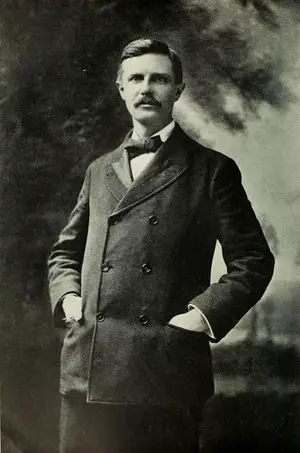- Recent changes
- Random page
- View source
- What links here
- Related changes
- Special pages
- Printable version
- Permanent link
- Page information
- Create account

Why was the Turner Thesis abandoned by historians

Fredrick Jackson Turner’s thesis of the American frontier defined the study of the American West during the 20th century. In 1893, Turner argued that “American history has been in a large degree the history of the colonization of the Great West. The existence of an area of free land, its continuous recession, and the advance of American settlement westward explain American development.” ( The Frontier in American History , Turner, p. 1.) Jackson believed that westward expansion allowed America to move away from the influence of Europe and gain “independence on American lines.” (Turner, p. 4.) The conquest of the frontier forced Americans to become smart, resourceful, and democratic. By focusing his analysis on people in the periphery, Turner de-emphasized the importance of everyone else. Additionally, many people who lived on the “frontier” were not part of his thesis because they did not fit his model of the democratizing American. The closing of the frontier in 1890 by the Superintendent of the census prompted Turner’s thesis.
Despite its faults, his thesis proved powerful because it succinctly summed up the concerns of Turner and his contemporaries. More importantly, it created an appealing grand narrative for American history. Many Americans were concerned that American freedom would be diminished by the end of colonization of the West. Not only did his thesis give voice to these Americans’ concerns, but it also represented how Americans wanted to see themselves. Unfortunately, the history of the American West became the history of westward expansion and the history of the region of the American West was disregarded. The grand tapestry of western history was essentially ignored. During the mid-twentieth century, most people lost interest in the history of the American West.
While appealing, the Turner thesis stultified scholarship on the West. In 1984, colonial historian James Henretta even stated, “[f]or, in our role as scholars, we must recognize that the subject of westward expansion in itself longer engages the attention of many perhaps most, historians of the United States.” ( Legacy of Conquest , Patricia Limerick, p. 21.) Turner’s thesis had effectively shaped popular opinion and historical scholarship of the American West, but the thesis slowed continued academic interest in the field.
Reassessment of Western History
In the last half of the twentieth century, a new wave of western historians rebelled against the Turner thesis and defined themselves by their opposition to it. Historians began to approach the field from different perspectives and investigated the lives of Women, miners, Chicanos, Indians, Asians, and African Americans. Additionally, historians studied regions that would not have been relevant to Turner. In 1987, Patricia Limerick tried to redefine the study of the American West for a new generation of western scholars. In Legacy of Conquest, she attempted to synthesize the scholarship on the West to that point and provide a new approach for re-examining the West. First, she asked historians to think of the America West as a place and not as a movement. Second, she emphasized that the history of the American West was defined by conquest; “[c]onquest forms the historical bedrock of the whole nation, and the American West is a preeminent case study in conquest and its consequences.” (Limerick, p. 22.)
Finally, she asked historians to eliminate the stereotypes from Western history and try to understand the complex relations between the people of the West. Even before Limerick’s manifesto, scholars were re-evaluating the west and its people, and its pace has only quickened. Whether or not scholars agree with Limerick, they have explored new depths of Western American history. While these new works are not easy to categorize, they do fit into some loose categories: gender ( Relations of Rescue by Peggy Pascoe), ethnicity ( The Roots of Dependency by Richard White, and Lewis and Clark Among the Indians by James P. Rhonda), immigration (Impossible Subjects by Ming Ngai), and environmental (Nature’s Metropolis by William Cronon, Rivers of Empire by Donald Worster) history. These are just a few of the topics that have been examined by American West scholars. This paper will examine how these new histories of the American West resemble or diverge from Limerick’s outline.
Defining America or a Threat to America's Moral Standing
Peggy Pascoe’s Relations of Rescue described the creation and operation of Rescue Homes in Salt Lake City, the Sioux Reservation, Denver and San Francisco by missionary women for abused, neglected and exploited women. By focusing on the missionaries and the tenants of these homes, Pascoe depicted not just relations between women, but provided examples of how missionaries responded to issues which they believed were unique in the West. Issues that not only challenged the Victorian moral authority but threatened America’s moral standing. Unlike Turner, the missionary women did not believe that the West was an engine for democracy; instead, they envisioned a place where immoral practice such as polygamy, prostitution, premarital pregnancy, and religious superstition thrived and threatened women’s moral authority. Instead of attempting to portray a prototypical frontier or missionary woman, Pascoe reveals complicated women who defy easy categorization. Instead of re-enforcing stereotypes that women civilized (a dubious term at best) the American West, she instead focused on three aspects of the search for female moral authority: “its benefits and liabilities for women’s empowerment; its relationship to systems of social control; and its implication for intercultural relations among women.” (Pascoe, p. xvii.) Pascoe used a study of intercultural relations between women to better understand each of the sub-cultures (missionaries, unmarried mothers, Chinese prostitutes, Mormon women, and Sioux women) and their relations with governmental authorities and men.
Unlike Limerick, Pascoe did not find it necessary to define the west or the frontier. She did not have to because the Protestant missionaries in her story defined it for her. While Turner may have believed that the West was no longer the frontier in 1890, the missionaries certainly would have disagreed. In fact, the rescue missions were placed in the communities that the Victorian Protestant missionary judged to be the least “civilized” parts of America (Lakota Territory, San Francisco’s Chinatown, rough and tumble Denver and Salt Lake City.) Instead of being a story of conquest by Victorian or western morality, it was a story of how that morality was often challenged and its terms were negotiated by culturally different communities. Pascoe’s primary goal in this work was not only to eliminate stereotypes but to challenge the notion that white women civilized the west. While conquest may be a component of other histories, no one group in Pascoe’s story successfully dominated any other.
Changing the Narrative of Native Americans in the West
Two books were written before Legacy was published, Lewis and Clark Among the Indians (James Rhonda) and The Roots of Dependency (Richard White) both provide a window into the world of Native Americans. Both books took new approaches to Native American histories. Rhonda’s book looked at the familiar Lewis and Clark expedition but from an entirely different angle. Rhonda described the interactions between the expedition and the various Native American tribes they encountered. White’s book also sought to describe the interactions between the United States and the Choctaws, Pawnees, and Navajos, but he sought to explain why the economies of these tribes broke down after contact. Each of these books covers new ground by addressing the impact of these interactions between the United States and the Native Americans.

Whether or not Rhonda’s work is an example of the New Western History is debatable, but he sought to eliminate racial stereotypes of Native Americans and describe the first governmental attempt to conquer the western landscape by traversing it. Rhonda described the interactions between the expedition and the various Indians who encountered it. While Rhonda’s book may resemble a classic Lewis and Clark history, it provides a much more nuanced examination of the limitations and effectiveness of the diplomatic aspects of the Lewis and Clark expedition. He took a great of time to describe each of the interactions with the Indian tribes in detail. Rhonda recognized that the interactions between the expedition and the various tribes were nuanced and complex. Rhonda’s work clarified that Native Americans had differing views of the Lewis and Clark expedition. Any stereotypes the reader may have regarding the Native Americans with would have shattered. Additionally, Rhonda described how the expedition persevered despite its clumsy attempts at diplomacy.
Instead of describing the initial interactions of the United States government with the Choctaws, Pawnees, and Navajos, White explained how the self-sufficient economies of these people were destroyed. White described how the United States government turned these successful native people into wards of the American state. His story explained how the United States conquered these tribes without firing a shot. The consequence of this conquest was the creation of weak, dependent nations that could not survive without handouts from the federal government. Like Rhonda, White also sought to shatter long-standing stereotypes and myths regarding Native Americans. White verified that each of these tribes had self-sufficient economies which permitted prosperous lifestyles for their people before the devastating interactions with the United States government occurred. The United States in each case fundamentally altered the tribes’ economies and environments. These alterations threatened the survival of the tribes. In some cases, the United States sought to trade with these tribes in an effort put the tribes in debt. After the tribes were in debt, the United States then forced the tribes to sell their land. In other situations, the government damaged the tribes’ economies even when they sought to help them.
Even though White book was published a few years before Legacy, The Roots of Dependency certainly satisfies some of Limerick’s stated goals. Conquest and its consequences are at the heart of White’s story. White details the problems these societies developed after they became dependant on American trade goods and handouts. White also dissuaded anyone from believing that the Native American economies were inefficient. The Choctaws, Pawnees, and Navajos economies were successful. The Choctaws and Pawnees had thriving economies and their food supplies were more than sufficient. While the Navajos were not as successful as the other two tribes, their story was remarkable because they learned how to survive in some of the most inhospitable lands in the American West. These stories exploded the myths that the Native Americans subsistence economies were somehow insufficient.
The Impact of Immigrants to the West
The American West was both a borderland and a destination for a multitude of immigrants. Native Americans, Spaniards, Mexicans, Anglos, and Asians have all immigrated into the American West. The American West has seen waves of immigration. These immigrants have constantly changed the complexion of its people. Starting with the Native Americans who first moved into the region and the most recent tide of undocumented Mexican immigrants, the West has always been a place where immigrants seeking their fortunes. The California gold rush brought in a number of immigrants who did not fit their American ideal. When non-whites started immigrating to California, the United States was faced with a new problem, the introduction of people who could not become citizens. Chinese immigrants troubled the Anglo majority because they could not be easily assimilated into American society. Additionally, many Americans were perplexed by their substantially different appearances, clothing, religions, and cultures. Anglos became concerned that the new immigrants differed too much from them. In 1924, after 150 years of unregulated immigration, the United States Congress passed the Johnson-Reed Act, the most restrictionist immigration law in US history. The Johnson-Reed Act was specifically designed to keep the most undesirable races out of America, but immigrants continued to arrive in America without documents. Ming Ngai’s Impossible Subjects addresses this new class of immigrants: illegal immigrants. Illegal immigrants began to flow into the United States soon after the passage of the Johnson-Reed Act.
While illegal immigration is not an issue isolated to the history of the American West, the immigrants moved predominantly into California, Texas and the American Southwest. Like Anglo settlers who were attracted to the West for the potential for new life in the nineteenth century, illegal immigrants continued to move in during the twentieth. The illegal immigrants were welcomed, despite their status, because California’s large commercial farms needed inexpensive labor to harvest their crops. Impossible Subjects describes four groups of illegal immigrants (Filipinos, Japanese, Chinese and Mexican braceros) who were created by the United States immigration policy. Ngai specifically examines the role that the government played in defining, controlling and disciplining these groups for their allegedly illegal misconduct.
Impossible Subjects is not a book on the American West, but it is a book that is very much about the American West. While Ngai’s story primarily takes place in the American West she does not appear to have any interest in defining the West because her story has national implications. The American West is relevant to her study only because it was where most of the illegal immigrants described in her story lived and worked. Additionally, it is not a story of conquest and its consequences, but it introduced the American public and scholars to members of the American society that are silent. Limerick even stated that while “Indians, Hispanics, Asians, blacks, Anglos, businesspeople, workers, politicians, bureaucrats, natives and newcomers” all shared the same region, they still needed to be introduced to one another. In addition to being a sophisticated policy debate on immigration law, Ngai’s work introduced Americans to these people. (Limerick, p. 349.)
The Rise of Western Environmental History
Environmental history has become an increasingly important component of the history of the American West. Originally, the American West was seen as an untamed wilderness, but over time that description has changed. Two conceptually different, but nonetheless important books on environmental history discussed the American West and its importance in America. Nature’s Metropolis by William Cronon and Rivers of Empire by Donald Worster each explored the environment and the economy of the American West. Cronon examined the formation of Chicago and the importance of its commodities market for the development of the American West. Alternatively, Worster focuses on the creation of an extensive network of government subsidized dams in the early twentieth century. Rivers of Empire describes that despite the aridity of the natural landscape the American West became home to massive commercial farms and enormous swaths of urban sprawl.
In Nature’s Metropolis , Cronon, used the central place theory to analyze the economic and ecological development of Chicago. Johann Heinrich von Thunen developed the central place theory to explain the development of cities. Essentially, geographically different economic zones form in concentric circles the farther you went from the city. These different zones form because of the time it takes to get the different types of goods to market. Closest to the city and then moving away you would have the following zones: first, intensive agriculture, second, extensive agriculture, third, livestock raising, fourth, trading, hunting and Indian trade and finally, you would have the wilderness. While the landscape of the Mid-West was more complicated than this, Cronon posits that the “city and country are inextricably connected and that market relations profoundly mediate between them.” (Cronon, p. 52.) By emphasizing the connection between the city of Chicago and the rural lands that surrounded it, Cronon was able to explain how the land, including the West, developed. Cronon argued that the development of Chicago had a profound influence on the development and appearance of the Great West. Essentially Cronon used the creation of the Chicago commodities and trading markets to explain how different parts of the Mid-West and West produced different types of resources and fundamentally altered their ecology.
According to Donald Worster’s Rivers of Empire, economics played an equally important role in the economic and environmental development of the Rocky Mountain and Pacific Slope states. Worster argued that the United States wanted to continue creating family farms for Americans in the West. Unfortunately, the aridity of the west made that impossible. The land in the West simply could not be farmed without water. Instead of adapting to the natural environment, the United States government embarked on the largest dam building project in human history. The government built thousands of dams to irrigate millions of acres of land. Unfortunately, the cost of these numerous irrigation projects was enormous. The federal government passed the cost on to the buyers of the land which prevented family farmers from buying it. Therefore, instead of family farms, massive commercial farms were created. The only people who could afford to buy the land were wealthy citizens. The massive irrigation also permitted the creation of cities which never would have been possible without it. Worster argues that the ensuing ecological damage to the West has been extraordinary. The natural environment throughout the region was dramatically altered. The west is now the home of oversized commercial farms, artificial reservoirs which stretch for hundreds of miles, rivers that run only on command and sprawling cities which depend on irrigation.
Both Cronon and Worster described how commercial interests shaped the landscape and ecology of the American West, but their approaches were very different. Still, each work fits comfortably into the new western history. Both Cronon and Worster see the West as a place and not as a movement of westward expansion. Cronon re-orders the typical understanding of the sequence of westward expansion. Instead of describing the steady growth of rural communities which transformed into cities, he argued that cities and rural areas formed at the same time. Often the cities developed first and that only after markets were created could land be converted profitable into farms. This development fits westward development much more closely than paradigms that emphasized the creation of family farms. Worster defines the West by its aridity. While these definitions differ from Limerick’s, they reflect new approaches. Conquest plays a critical role in each of these books. Instead of conquering people, the authors describe efforts to conquer western lands. In Cronon, westerners forever altered the landscape of the west. Agricultural activities dominated the zones closest to Chicago, cattle production took over lands previously occupied by the buffalo, and even the wilderness was changed by people to satisfy the markets in Chicago. The extensive damming of the West’s rivers described by Worster required the United States government to conquer, control and discipline nature. While this conquest was somewhat illusory, the United States government was committed to reshaping the West and ecology to fit its vision.
Each of these books demonstrates that the Turner thesis no longer holds a predominant position in the scholarship of the American West. The history of the American West has been revitalized by its demise. While westward expansion plays an important role in the history of the United States, it did not define the west. Turner’s thesis was fundamentally undermined because it did not provide an accurate description of how the West was peopled. The nineteenth century of the west is not composed primarily of family farmers. Instead, it is a story of a region peopled by a diverse group of people: Native Americans, Asians, Chicanos, Anglos, African Americans, women, merchants, immigrants, prostitutes, swindlers, doctors, lawyers, farmers are just a few of the characters who inhabit western history.
Suggested Readings
- Frederick Jackson Turner, The Frontier in American History
- Patricia Limerick, Legacy of Conquest
- Peggy Pascoe, Relations of Rescue
- Richard White, The Roots of Dependency
- Nature's Metropolis, William Cronon
- Rivers of Empire, Donald Worster
- Historiography
- Book Review
- This page was last edited on 5 October 2021, at 01:36.
- Privacy policy
- About DailyHistory.org
- Disclaimers
- Mobile view
How the Myth of the American Frontier Got Its Start
Frederick Jackson Turner’s thesis informed decades of scholarship and culture. Then he realized he was wrong
/https://tf-cmsv2-smithsonianmag-media.s3.amazonaws.com/accounts/headshot/Colin_Woodard_PPH_Photo_crop_thumbnail_1.png)
Colin Woodard
:focal(400x301:401x302)/https://tf-cmsv2-smithsonianmag-media.s3.amazonaws.com/filer_public/12/11/1211e4cd-7311-4c83-9370-d86aa5ebc2d5/illustration_of_people_on_horseback_looking_at_an_open_landscape.jpg)
On the evening of July 12, 1893, in the hall of a massive new Beaux-Arts building that would soon house the Art Institute of Chicago, a young professor named Frederick Jackson Turner rose to present what would become the most influential essay in the study of U.S. history.
It was getting late. The lecture hall was stifling from a day of blazing sun, which had tormented the throngs visiting the nearby Chicago World’s Columbian Exposition, a carnival of never-before-seen wonders, like a fully illuminated electric city and George Ferris’ 264-foot-tall rotating observation wheel. Many of the hundred or so historians attending the conference, a meeting of the American Historical Association (AHA), were dazed and dusty from an afternoon spent watching Buffalo Bill’s Wild West show at a stadium near the fairground’s gates. They had already sat through three other speeches. Some may have been dozing off as the thin, 31-year-old associate professor from the University of Wisconsin in nearby Madison began his remarks.

Subscribe to Smithsonian magazine now for just $19.99
This article is a selection from the January/February 2023 issue of Smithsonian magazine
Turner told them the force that had forged Americans into one people was the frontier of the Midwest and Far West. In this virgin world, settlers had finally been relieved of the European baggage of feudalism that their ancestors had brought across the Atlantic, freeing them to find their true selves: self-sufficient, pragmatic, egalitarian and civic-minded. “The frontier promoted the formation of a composite nationality for the American people,” he told the audience. “In the crucible of the frontier, the immigrants were Americanized, liberated and fused into a mixed race, English in neither nationality nor characteristics.”
The audience was unmoved.
In their dispatches the following morning, most of the newspaper reporters covering the conference didn’t even mention Turner’s talk. Nor did the official account of the proceedings prepared by the librarian William F. Poole for The Dial , an influential literary journal. Turner’s own father, writing to relatives a few days later, praised Turner’s skills as the family’s guide at the fair, but he said nothing at all about the speech that had brought them there.
Yet in less than a decade, Turner would be the most influential living historian in the United States, and his Frontier Thesis would become the dominant lens through which Americans understood their character, origins and destiny. Soon, Jackson’s theme was prevalent in political speech, in the way high schools taught history, in patriotic paintings—in short, everywhere. Perfectly timed to meet the needs of a country experiencing dramatic and destabilizing change, Turner’s thesis was swiftly embraced by academic and political institutions, just as railroads, manufacturing machines and telegraph systems were rapidly reshaping American life.
By that time, Turner himself had realized that his theory was almost entirely wrong.
American historians had long believed that Providence had chosen their people to spread Anglo-Saxon freedom across the continent. As an undergraduate at the University of Wisconsin, Turner was introduced to a different argument by his mentor, the classical scholar William Francis Allen. Extrapolating from Darwinism, Allen believed societies evolved like organisms, adapting themselves to the environments they encountered. Scientific laws, not divine will, he advised his mentee, guided the course of nations. After graduating, Turner pursued a doctorate at Johns Hopkins University, where he impressed the history program’s leader, Herbert Baxter Adams, and formed a lifelong friendship with one of his teachers, an ambitious young professor named Woodrow Wilson. The connections were useful: When Allen died in 1889, Adams and Wilson aided Turner in his quest to take Allen’s place as head of Wisconsin’s history department. And on the strength of Turner’s early work, Adams invited him to present a paper at the 1893 meeting of the AHA, to be held in conjunction with the World’s Congress Auxiliary of the World’s Columbian Exposition.
/https://tf-cmsv2-smithsonianmag-media.s3.amazonaws.com/filer_public/61/bc/61bc38a7-853f-4c6b-823e-71c95d62687d/manifest_destiny.jpg)
The resulting essay, “The Significance of the Frontier in American History,” offered a vivid evocation of life in the American West. Stripped of “the garments of civilization,” settlers between the 1780s and the 1830s found themselves “in the birch canoe” wearing “the hunting shirt and the moccasin.” Soon, they were “planting Indian corn and plowing with a sharp stick” and even shouting war cries. Faced with Native American resistance—Turner largely overlooked what the ethnic cleansing campaign that created all that “free land” might say about the American character—the settlers looked to the federal government for protection from Native enemies and foreign empires, including during the War of 1812, thus fostering a loyalty to the nation rather than to their half-forgotten nations of origin.
He warned that with the disappearance of the force that had shaped them—in 1890, the head of the Census Bureau concluded there was no longer a frontier line between areas that had been settled by European Americans and those that had not—Americans would no longer be able to flee west for an easy escape from responsibility, failure or oppression. “Each frontier did indeed furnish a new field of opportunity, a gate of escape from the bondage of the past,” Turner concluded. “Now … the frontier has gone, and with its going has closed the first period of American history.”
When he left the podium on that sweltering night, he could not have known how fervently the nation would embrace his thesis.
/https://tf-cmsv2-smithsonianmag-media.s3.amazonaws.com/filer_public/3a/1d/3a1d78c2-4533-4dbf-9fc9-66306936b710/white_guy.jpg)
Like so many young scholars, Turner worked hard to bring attention to his thesis. He incorporated it into the graduate seminars he taught, lectured about it across the Midwest and wrote the entry for “Frontier” in the widely read Johnson’s Universal Cyclopædia. He arranged to have the thesis reprinted in the journal of the Wisconsin Historical Society and in the AHA’s 1893 annual report. Wilson championed it in his own writings, and the essay was read by hundreds of schoolteachers who found it reprinted in the popular pedagogical journal of the Herbart Society, a group devoted to the scientific study of teaching. Turner’s big break came when the Atlantic Monthly ’s editors asked him to use his novel viewpoint to explain the sudden rise of populists in the rural Midwest, and how they had managed to seize control of the Democratic Party to make their candidate, William Jennings Bryan, its nominee for president. Turner’s 1896 Atlantic Monthly essay , which tied the populists’ agitation to the social pressures allegedly caused by the closing of the frontier—soil depletion, debt, rising land prices—was promptly picked up by newspapers and popular journals across the country.
Meanwhile, Turner’s graduate students became tenured professors and disseminated his ideas to the up-and-coming generation of academics. The thrust of the thesis appeared in political speeches, dime-store western novels and even the new popular medium of film, where it fueled the work of a young director named John Ford who would become the master of the Hollywood western. In 1911, Columbia University’s David Muzzey incorporated it into a textbook—initially titled History of the American People —that would be used by most of the nation’s secondary schools for half a century.
Americans embraced Turner’s argument because it provided a fresh and credible explanation for the nation’s exceptionalism—the notion that the U.S. follows a path soaring above those of other countries—one that relied not on earlier Calvinist notions of being “the elect,” but rather on the scientific (and fashionable) observations of Charles Darwin. In a rapidly diversifying country, the Frontier Thesis denied a special role to the Eastern colonies’ British heritage; we were instead a “composite nation,” birthed in the Mississippi watershed. Turner’s emphasis on mobility, progress and individualism echoed the values of the Gilded Age—when readers devoured Horatio Alger’s rags-to-riches stories—and lent them credibility for the generations to follow.
/https://tf-cmsv2-smithsonianmag-media.s3.amazonaws.com/filer_public/ea/69/ea696129-c32c-4947-9ce7-64648e2f2cea/janfeb2023_e01_prologue.jpg)
But as a researcher, Turner himself turned away from the Frontier Thesis in the years after the 1890s. He never wrote it down in book form or even in academic articles. He declined invitations to defend it, and before long he himself lost faith in it.
For one thing, he had been relying too narrowly on the experiences in his own region of the Upper Midwest, which had been colonized by a settlement stream originating in New England. In fact, he found, the values he had ascribed to the frontier’s environmental conditioning were actually those of this Greater New England settlement culture, one his family and most of his fellow citizens in Portage, Wisconsin, remained part of, with their commitment to strong village and town governments, taxpayer-financed public schools and the direct democracy of the town meeting. He saw that other parts of the frontier had been colonized by other settlement streams anchored in Scots-Irish Appalachia or in the slave plantations of the Southern lowlands, and he noted that their populations continued to behave completely differently from one another, both politically and culturally, even when they lived in similar physical environments. Somehow settlers moving west from these distinct regional cultures were resisting the Darwinian environmental and cultural forces that had supposedly forged, as Turner’s biographer, Ray Allen Billington, put it, “a new political species” of human, the American. Instead, they were stubbornly remaining themselves. “Men are not absolutely dictated to by climate, geography, soils or economic interests,” Turner wrote in 1922. “The influence of the stock from which they sprang, the inherited ideals, the spiritual factors, often triumph over the material interests.”
Turner spent the last decades of his life working on what he intended to be his magnum opus, a book not about American unity but rather about the abiding differences between its regions, or “sections,” as he called them. “In respect to problems of common action, we are like what a United States of Europe would be,” he wrote in 1922, at the age of 60. For example, the Scots-Irish and German small farmers and herders who settled the uplands of the southeastern states had long clashed with nearby English enslavers over education spending, tax policy and political representation. Turner saw the whole history of the country as a wrestling match between these smaller quasi-nations, albeit a largely peaceful one guided by rules, laws and shared American ideals: “When we think of the Missouri Compromise, the Compromise of 1850, the Kansas-Nebraska Act, as steps in the marking off of spheres of influence and the assignment of mandates [between nations] … we see a resemblance to what has gone on in the Old World,” Turner explained. He hoped shared ideals—and federal institutions—would prove cohesive for a nation suddenly coming of age, its frontier closed, its people having to steward their lands rather than striking out for someplace new.
/https://tf-cmsv2-smithsonianmag-media.s3.amazonaws.com/filer_public/ea/79/ea79b5eb-7dd4-4ca0-9d75-f4ad5333a116/janfeb2023_e12_prologue.jpg)
Get the latest History stories in your inbox?
Click to visit our Privacy Statement .
/https://tf-cmsv2-smithsonianmag-media.s3.amazonaws.com/accounts/headshot/Colin_Woodard_PPH_Photo_crop_thumbnail_1.png)
Colin Woodard | | READ MORE
Colin Woodard is a journalist and historian, and the author of six books including Union: The Struggle to Forge the Story of United States Nationhood . He lives in Maine.

- school Campus Bookshelves
- menu_book Bookshelves
- perm_media Learning Objects
- login Login
- how_to_reg Request Instructor Account
- hub Instructor Commons
- Download Page (PDF)
- Download Full Book (PDF)
- Periodic Table
- Physics Constants
- Scientific Calculator
- Reference & Cite
- Tools expand_more
- Readability
selected template will load here
This action is not available.

17.9: The West as History- the Turner Thesis
- Last updated
- Save as PDF
- Page ID 10013

- American YAWP
- Stanford via Stanford University Press
.png?revision=1)
In 1893, the American Historical Association met during that year’s World’s Columbian Exposition in Chicago. The young Wisconsin historian Frederick Jackson Turner presented his “frontier thesis,” one of the most influential theories of American history, in his essay “The Significance of the Frontier in American History.”
Turner looked back at the historical changes in the West and saw, instead of a tsunami of war and plunder and industry, waves of “civilization” that washed across the continent. A frontier line “between savagery and civilization” had moved west from the earliest English settlements in Massachusetts and Virginia across the Appalachians to the Mississippi and finally across the Plains to California and Oregon. Turner invited his audience to “stand at Cumberland Gap [the famous pass through the Appalachian Mountains], and watch the procession of civilization, marching single file—the buffalo following the trail to the salt springs, the Indian, the fur trader and hunter, the cattle-raiser, the pioneer farmer—and the frontier has passed by.” 26
Americans, Turner said, had been forced by necessity to build a rough-hewn civilization out of the frontier, giving the nation its exceptional hustle and its democratic spirit and distinguishing North America from the stale monarchies of Europe. Moreover, the style of history Turner called for was democratic as well, arguing that the work of ordinary people (in this case, pioneers) deserved the same study as that of great statesmen. Such was a novel approach in 1893.
But Turner looked ominously to the future. The Census Bureau in 1890 had declared the frontier closed. There was no longer a discernible line running north to south that, Turner said, any longer divided civilization from savagery. Turner worried for the United States’ future: what would become of the nation without the safety valve of the frontier? It was a common sentiment. Theodore Roosevelt wrote to Turner that his essay “put into shape a good deal of thought that has been floating around rather loosely.” 27
The history of the West was many-sided and it was made by many persons and peoples. Turner’s thesis was rife with faults, not only in its bald Anglo-Saxon chauvinism—in which nonwhites fell before the march of “civilization” and Chinese and Mexican immigrants were invisible—but in its utter inability to appreciate the impact of technology and government subsidies and large-scale economic enterprises alongside the work of hardy pioneers. Still, Turner’s thesis held an almost canonical position among historians for much of the twentieth century and, more importantly, captured Americans’ enduring romanticization of the West and the simplification of a long and complicated story into a march of progress.
The American Yawp Reader
Frederick jackson turner, “significance of the frontier in american history” (1893).
Perhaps the most influential essay by an American historian, Frederick Jackson Turner’s address to the American Historical Association on “The Significance of the Frontier in American History” defined for many Americans the relationship between the frontier and American culture and contemplated what might follow “the closing of the frontier.”
In a recent bulletin of the Superintendent of the Census for 1890 appear these significant words: “Up to and including 1880 the country had a frontier of settlement, but at present the unsettled area has been so broken into by isolated bodies of settlement that there can hardly be said to be a frontier line. In the discussion of its extent, its westward movement, etc., it can not, therefore, any longer have a place in the census reports.” This brief official statement marks the closing of a great historic movement. Up to our own day American history has been in a large degree the history of the colonization of the Great West. The existence of an area of free land, its continuous recession, and the advance of American settlement westward, explain American development.
Behind institutions, behind constitutional forms and modifications, lie the vital forces that call these organs into life and shape them to meet changing conditions. The peculiarity of American institutions is, the fact that they have been compelled to adapt themselves to the changes of an expanding people—to the changes involved in crossing a continent, in winning a wilderness, and in developing at each area of this progress out of the primitive economic and political conditions of the frontier into the complexity of city life. Said Calhoun in 1817, “We are great, and rapidly—I was about to say fearfully—growing!” So saying, he touched the distinguishing feature of American life. All peoples show development; the germ theory of politics has been sufficiently emphasized. In the case of most nations, however, the development has occurred in a limited area; and if the nation has expanded, it has met other growing peoples whom it has conquered. But in the case of the United States we have a different phenomenon. Limiting our attention to the Atlantic coast, we have the familiar phenomenon of the evolution of institutions in a limited area, such as the rise of representative government; the differentiation of simple colonial governments into complex organs; the progress from primitive industrial society, without division of labor, up to manufacturing civilization. But we have in addition to this a recurrence of the process of evolution in each western area reached in the process of expansion. Thus American development has exhibited not merely advance along a single line, but a return to primitive conditions on a continually advancing frontier line, and a new development for that area. American social development has been continually beginning over again on the frontier. This perennial rebirth, this fluidity of American life, this expansion westward with its new opportunities, its continuous touch with the simplicity of primitive society, furnish the forces dominating American character. The true point of view in the history of this nation is not the Atlantic coast, it is the Great West. …
In this advance, the frontier is the outer edge of the wave—the meeting point between savagery and civilization. Much has been written about the frontier from the point of view of border warfare and the chase, but as a field for the serious study of the economist and the historian it has been neglected.
From the conditions of frontier life came intellectual traits of profound importance. The works of travelers along each frontier from colonial days onward describe certain common traits, and these traits have, while softening down, still persisted as survivals in the place of their origin, even when a higher social organization succeeded. The result is that to the frontier the American intellect owes its striking characteristics. That coarseness and strength combined with acuteness and inquisitiveness; that practical, inventive turn of mind, quick to find expedients; that masterful grasp of material things, lacking in the artistic but powerful to effect great ends; that restless, nervous energy; that dominant individualism, working for good and for evil, and withal that buoyancy and exuberance which comes with freedom—these are traits of the frontier, or traits called out elsewhere because of the existence of the frontier. Since the days when the fleet of Columbus sailed into the waters of the New World, America has been another name for opportunity, and the people of the United States have taken their tone from the incessant expansion which has not only been open but has even been forced upon them. He would be a rash prophet who should assert that the expansive character of American life has now entirely ceased. Movement has been its dominant fact, and, unless this training has no effect upon a people, the American energy will continually demand a wider field for its exercise. But never again will such gifts of free land offer themselves. For a moment, at the frontier, the bonds of custom are broken and unrestraint is triumphant. There is not tabula rasa . The stubborn American environment is there with its imperious summons to accept its conditions; the inherited ways of doing things are also there; and yet, in spite of environment, and in spite of custom, each frontier did indeed furnish a new field of opportunity, a gate of escape from the bondage of the past; and freshness, and confidence, and scorn of older society, impatience of its restraints and its ideas, and indifference to its lessons, have accompanied the frontier. What the Mediterranean Sea was to the Greeks, breaking the bond of custom, offering new experiences, calling out new institutions and activities, that, and more, the ever retreating frontier has been to the United States directly, and to the nations of Europe more remotely. And now, four centuries from the discovery of America, at the end of a hundred years of life under the Constitution, the frontier has gone, and with its going has closed the first period of American history.
Source: Frederick Jackson Turner, The Frontier in American History, 1919.
Conquering the West
The west as history: the turner thesis.
In 1893, the American Historical Association met during that year’s World’s Columbian Exposition in Chicago. The young Wisconsin historian Frederick Jackson Turner presented his “frontier thesis,” one of the most influential theories of American history, in his essay, “The Significance of the Frontier in American History.”
Turner looked back at the historical changes in the West and saw, instead of a tsunami of war and plunder and industry, waves of “civilization” that washed across the continent. A frontier line “between savagery and civilization” had moved west from the earliest English settlements in Massachusetts and Virginia across the Appalachians to the Mississippi and finally across the Plains to California and Oregon. Turner invited his audience to “stand at Cumberland Gap [the famous pass through the Appalachian Mountains], and watch the procession of civilization, marching single file—the buffalo following the trail to the salt springs, the Indian, the fur trader and hunter, the cattle-raiser, the pioneer farmer—and the frontier has passed by.”
Americans, Turner said, had been forced by necessity to build a rough-hewn civilization out of the frontier, giving the nation its exceptional hustle and its democratic spirit and distinguishing North America from the stale monarchies of Europe. Moreover, the style of history Turner called for was democratic as well, arguing that the work of ordinary people (in this case, pioneers) deserved the same study as that of great statesmen. Such was a novel approach in 1893.
But Turner looked ominously to the future. The Census Bureau in 1890 had declared the frontier closed. There was no longer a discernible line running north to south that, Turner said, any longer divided civilization from savagery. Turner worried for the United States’ future: what would become of the nation without the safety valve of the frontier? It was a common sentiment. Theodore Roosevelt wrote to Turner that his essay “put into shape a good deal of thought that has been floating around rather loosely.”
The history of the West was many-sided and it was made by many persons and peoples. Turner’s thesis was rife with faults, not only its bald Anglo Saxon chauvinism—in which non-whites fell before the march of “civilization” and Chinese and Mexican immigrants were invisible—but in its utter inability to appreciate the impact of technology and government subsidies and large-scale economic enterprises alongside the work of hardy pioneers. Still, Turner’s thesis held an almost canonical position among historians for much of the twentieth century and, more importantly, captured Americans’ enduring romanticization of the West and the simplification of a long and complicated story into a march of progress.
This chapter was edited by Lauren Brand, with content contributions by Lauren Brand, Carole Butcher, Josh Garrett-Davis, Tracey Hanshew, Nick Roland, David Schley, Emma Teitelman, and Alyce Vigil.
- American Yawp. Located at : http://www.americanyawp.com/index.html . Project : American Yawp. License : CC BY-SA: Attribution-ShareAlike
- AHA Communities
- Buy AHA Merchandise
- Cookies and Privacy Policy
In This Section
- Brief History of the AHA
- Annual Reports
- Year in Review
- Historical Archives
- Presidential Addresses
- GI Roundtable Series
- National History Center
The Significance of the Frontier in American History (1893)
By Frederick J. Turner, 1893
Editor's Note: Please note, this is a short version of the essay subsequently published in Turner's essay collection, The Frontier in American History (1920). This text is closer to the original version delivered at the 1893 meeting of the American Historical Association in Chicago, published in Annual Report of the American Historical Association , 1893, pp. 197–227.
In a recent bulletin of the Superintendent of the Census for 1890 appear these significant words: “Up to and including 1880 the country had a frontier of settlement, but at present the unsettled area has been so broken into by isolated bodies of settlement that there can hardly be said to be a frontier line. In the discussion of its extent, its westward movement, etc., it can not, therefore, any longer have a place in the census reports.” This brief official statement marks the closing of a great historic movement. Up to our own day American history has been in a large degree the history of the colonization of the Great West. The existence of an area of free land, its continuous recession, and the advance of American settlement westward, explain American development.
Behind institutions, behind constitutional forms and modifications, lie the vital forces that call these organs into life and shape them to meet changing conditions. The peculiarity of American institutions is, the fact that they have been compelled to adapt themselves to the changes of an expanding people—to the changes involved in crossing a continent, in winning a wilderness, and in developing at each area of this progress out of the primitive economic and political conditions of the frontier into the complexity of city life. Said Calhoun in 1817, “We are great, and rapidly—I was about to say fearfully—growing!” 1 So saying, he touched the distinguishing feature of American life. All peoples show development; the germ theory of politics has been sufficiently emphasized. In the case of most nations, however, the development has occurred in a limited area; and if the nation has expanded, it has met other growing peoples whom it has conquered. But in the case of the United States we have a different phenomenon. Limiting our attention to the Atlantic coast, we have the familiar phenomenon of the evolution of institutions in a limited area, such as the rise of representative government; the differentiation of simple colonial governments into complex organs; the progress from primitive industrial society, without division of labor, up to manufacturing civilization. But we have in addition to this a recurrence of the process of evolution in each western area reached in the process of expansion. Thus American development has exhibited not merely advance along a single line, but a return to primitive conditions on a continually advancing frontier line, and a new development for that area. American social development has been continually beginning over again on the frontier. This perennial rebirth, this fluidity of American life, this expansion westward with its new opportunities, its continuous touch with the simplicity of primitive society, furnish the forces dominating American character. The true point of view in the history of this nation is not the Atlantic coast, it is the great West. Even the slavery struggle, which is made so exclusive an object of attention by writers like Prof. von Holst, occupies its important place in American history because of its relation to westward expansion.
In this advance, the frontier is the outer edge of the wave—the meeting point between savagery and civilization. Much has been written about the frontier from the point of view of border warfare and the chase, but as a field for the serious study of the economist and the historian it has been neglected.
The American frontier is sharply distinguished from the European frontier—a fortified boundary line running through dense populations. The most significant thing about the American frontier is, that it lies at the hither edge of free land. In the census reports it is treated as the margin of that settlement which has a density of two or more to the square mile. The term is an elastic one, and for our purposes does not need sharp definition. We shall consider the whole frontier belt, including the Indian country and the outer margin of the “settled area” of the census reports. This paper will make no attempt to treat the subject exhaustively; its aim is simply to call attention to the frontier as a fertile field for investigation, and to suggest some of the problems which arise in connection with it.
In the settlement of America we have to observe how European life entered the continent, and how America modified and developed that life and reacted on Europe. Our early history is the study of European germs developing in an American environment. Too exclusive attention has been paid by institutional students to the Germanic origins, too little to the American factors. The frontier is the line of most rapid and effective Americanization. The wilderness masters the colonist. It finds him a European in dress, industries, tools, modes of travel, and thought. It takes him from the railroad car and puts him in the birch canoe. It strips off the garments of civilization and arrays him in the hunting shirt and the moccasin. It puts him in the log cabin of the Cherokee and Iroquois and runs an Indian palisade around him. Before long he has gone to planting Indian corn and plowing with a sharp stick; he shouts the war cry and takes the scalp in orthodox Indian fashion. In short, at the frontier the environment is at first too strong for the man. He must accept the conditions which it furnishes, or perish, and so he fits himself into the Indian clearings and follows the Indian trails. Little by little he transforms the wilderness; but the outcome is not the old Europe, not simply the development of Germanic germs, any more than the first phenomenon was a case of reversion to the Germanic mark. The fact is, that here is a new product that is American. At first, the frontier was the Atlantic coast. It was the frontier of Europe in a very real sense. Moving westward, the frontier became more and more American. As successive terminal moraines result from successive glaciations, so each frontier leaves its traces behind it, and when it becomes a settled area the region still partakes of the frontier characteristics. Thus the advance of the frontier has meant a steady movement away from the influence of Europe, a steady growth of independence on American lines. And to study this advance, the men who grew up under these conditions, and the political, economic, and social results of it, is to study the really American part of our history.
Stages of Frontier Advance
In the course of the seventeenth century the frontier was advanced up the Atlantic river courses, just beyond the “fall line,” and the tidewater region became the settled area. In the first half of the eighteenth century another advance occurred. Traders followed the Delaware and Shawnese Indians to the Ohio as early as the end of the first quarter of the century. 2 Gov. Spotswood, of Virginia, made an expedition in 1714 across the Blue Ridge. The end of the first quarter of the century saw the advance of the Scotch-Irish and the Palatine Germans up the Shenandoah Valley into the western part of Virginia, and along the Piedmont region of the Carolinas. 3 The Germans in New York pushed the frontier of settlement up the Mohawk to German Flats. 4 In Pennsylvania the town of Bedford indicates the line of settlement. Settlements had begun on New River, a branch of the Kanawha, and on the sources of the Yadkin and French Broad. 5 The King attempted to arrest the advance by his proclamation of 1763, 6 forbidding settlements beyond the sources of the rivers flowing into the Atlantic; but in vain. In the period of the Revolution the frontier crossed the Alleghanies into Kentucky and Tennessee, and the upper waters of the Ohio were settled. 7 When the first census was taken in 1790, the continuous settled area was bounded by a line which ran near the coast of Maine, and included New England except a portion of Vermont and New Hampshire, New York along the Hudson and up the Mohawk about Schenectady, eastern and southern Pennsylvania, Virginia well across the Shenandoah Valley, and the Carolinas and eastern Georgia. 8 Beyond this region of continuous settlement were the small settled areas of Kentucky and Tennessee, and the Ohio, with the mountains intervening between them and the Atlantic area, thus giving a new and important character to the frontier. The isolation of the region increased its peculiarly American tendencies, and the need of transportation facilities to connect it with the East called out important schemes of internal improvement, which will be noted farther on. The “West,” as a self-conscious section, began to evolve.
From decade to decade distinct advances of the frontier occurred. By the census of 1820, 9 the settled area included Ohio, southern Indiana and Illinois, southeastern Missouri, and about one-half of Louisiana. This settled area had surrounded Indian areas, and the management of these tribes became an object of political concern. The frontier region of the time lay along the Great Lakes, where Astor’s American Fur Company operated in the Indian trade, 10 and beyond the Mississippi, where Indian traders extended their activity even to the Rocky Mountains; Florida also furnished frontier conditions. The Mississippi River region was the scene of typical frontier settlements. 11
The rising steam navigation 12 on western waters, the opening of the Erie Canal, and the westward extension of cotton 13 culture added five frontier states to the Union in this period. Grund, writing in 1836, declares: “It appears then that the universal disposition of Americans to emigrate to the western wilderness, in order to enlarge their dominion over inanimate nature, is the actual result of an expansive power which is inherent in them, and which by continually agitating all classes of society is constantly throwing a large portion of the whole population on the extreme confines of the State, in order to gain space for its development. Hardly is a new State or Territory formed before the same principle manifests itself again and gives rise to a further emigration; and so is it destined to go on until a physical barrier must finally obstruct its progress.” 14
In the middle of this century the line indicated by the present eastern boundary of Indian Territory, Nebraska, and Kansas marked the frontier of the Indian country. 15 Minnesota and Wisconsin still exhibited frontier conditions, 16 but the distinctive frontier of the period is found in California, where the gold discoveries had sent a sudden tide of adventurous miners, and in Oregon, and the settlements in Utah. 17 As the frontier has leaped over the Alleghanies, so now it skipped the Great Plains and the Rocky Mountains; and in the same way that the advance of the frontiersmen beyond the Alleghanies had caused the rise of important questions of transportation and internal improvement, so now the settlers beyond the Rocky Mountains needed means of communication with the East, and in the furnishing of these arose the settlement of the Great Plains and the development of still another kind of frontier life. Railroads, fostered by land grants, sent an increasing tide of immigrants into the far West. The United States Army fought a series of Indian wars in Minnesota, Dakota, and the Indian Territory.
By 1880 the settled area had been pushed into northern Michigan, Wisconsin, and Minnesota, along Dakota rivers, and in the Black Hills region, and was ascending the rivers of Kansas and Nebraska. The development of mines in Colorado had drawn isolated frontier settlements into that region, and Montana and Idaho were receiving settlers. The frontier was found in these mining camps and the ranches of the Great Plains. The superintendent of the census for 1890 reports, as previously stated, that the settlements of the West lie so scattered over the region that there can no longer be said to be a frontier line.
In these successive frontiers we find natural boundary lines which have served to mark and to affect the characteristics of the frontiers, namely: The “fall line;” the Alleghany Mountains; the Mississippi; the Missouri, where its direction approximates north and south; the line of the arid lands, approximately the ninety-ninth meridian; and the Rocky Mountains. The fall line marked the frontier of the seventeenth century; the Alleghanies that of the eighteenth; the Mississippi that of the first quarter of the nineteenth; the Missouri that of the middle of this century (omitting the California movement); and the belt of the Rocky Mountains and the arid tract, the present frontier. Each was won by a series of Indian wars.
The Frontier Furnishes a Field for Comparative Study of Social Development
At the Atlantic frontier one can study the germs of processes repeated at each successive frontier. We have the complex European life sharply precipitated by the wilderness into the simplicity of primitive conditions. The first frontier had to meet its Indian question, its question of the disposition of the public domain, of the means of intercourse with older settlements, of the extension of political organization, of religious and educational activity. And the settlement of these and similar questions for one frontier served as a guide for the next. The American student needs not to go to the “prim little townships of Sleswick” for illustrations of the law of continuity and development. For example, he may study the origin of our land policies in the colonial land policy; he may see how the system grew by adapting the statutes to the customs of the successive frontiers. 18 He may see how the mining experience in the lead regions of Wisconsin, Illinois, and Iowa was applied to the mining laws of the Rockies, 19 and how our Indian policy has been a series of experimentations on successive frontiers. Each tier of new States has found in the older ones material for its constitutions. 20 Each frontier has made similar contributions to American character, as will be discussed farther on.
But with all these similarities there are essential differences, due to the place element and the time element. It is evident that the farming frontier of the Mississippi Valley presents different conditions from the mining frontier of the Rocky Mountains. The frontier reached by the Pacific Railroad, surveyed into rectangles, guarded by the United States Army, and recruited by the daily immigrant ship, moves forward at a swifter pace and in a different way than the frontier reached by the birch canoe or the pack horse. The geologist traces patiently the shores of ancient seas, maps their areas, and compares the older and the newer. It would be a work worth the historian’s labors to mark these various frontiers and in detail compare one with another. Not only would there result a more adequate conception of American development and characteristics, but invaluable additions would be made to the history of society.
Loria, 21 the Italian economist, has urged the study of colonial life as an aid in understanding the stages of European development, affirming that colonial settlement is for economic science what the mountain is for geology, bringing to light primitive stratifications. “America,” he says, “has the key to the historical enigma which Europe has sought for centuries in vain, and the land which has no history reveals luminously the course of universal history.” There is much truth in this. The United States lies like a huge page in the history of society. Line by line as we read this continental page from west to east we find the record of social evolution. It begins with the Indian and the hunter; it goes on to tell of the disintegration of savagery by the entrance of the trader, the pathfinder of civilization; we read the annals of the pastoral stage in ranch life; the exploitation of the soil by the raising of unrotated crops of corn and wheat in sparsely settled farming communities; the intensive culture of the denser farm settlement; and finally the manufacturing organization with city and factory system. 22 This page is familiar to the student of census statistics, but how little of it has been used by our historians. Particularly in eastern States this page is a palimpsest. What is now a manufacturing State was in an earlier decade an area of intensive farming. Earlier yet it had been a wheat area, and still earlier the “range” had attracted the cattle-herder. Thus Wisconsin, now developing manufacture, is a State with varied agricultural interests. But earlier it was given over to almost exclusive grain-raising, like North Dakota at the present time.
Each of these areas has had an influence in our economic and political history; the evolution of each into a higher stage has worked political transformations. But what constitutional historian has made any adequate attempt to interpret political facts by the light of these social areas and changes? 23
The Atlantic frontier was compounded of fisherman, far trader, miner, cattle-raiser, and farmer. Excepting the fisherman, each type of industry was on the march toward the West, impelled by an irresistible attraction. Each passed in successive waves across the continent. Stand at Cumberland Gap and watch the procession of civilization, marching single file—the buffalo following the trail to the salt springs, the Indian, the fur-trader and hunter, the cattle-raiser, the pioneer farmer—and the frontier has passed by. Stand at South Pass in the Rockies a century later and see the same procession with wider intervals between. The unequal rate of advance compels us to distinguish the frontier into the trader’s frontier, the rancher’s frontier, or the miner’s frontier, and the farmer’s frontier. When the mines and the cow pens were still near the fall line the traders’ pack trains were tinkling across the Alleghanies, and the French on the Great Lakes were fortifying their posts, alarmed by the British trader’s birch canoe. When the trappers scaled the Rockies, the farmer was still near the mouth of the Missouri.
The Indian Trader’s Frontier
Why was it that the Indian trader passed so rapidly across the continent? What effects followed from the trader’s frontier? The trade was coeval with American discovery, The Norsemen, Vespuccius, Verrazani, Hudson, John Smith, all trafficked for furs. The Plymouth pilgrims settled in Indian cornfields, and their first return cargo was of beaver and lumber. The records of the various New England colonies show how steadily exploration was carried into the wilderness by this trade. What is true for New England is, as would be expected, even plainer for the rest of the colonies. All along the coast from Maine to Georgia the Indian trade opened up the river courses. Steadily the trader passed westward, utilizing the older lines of French trade. The Ohio, the Great Lakes, the Mississippi, the Missouri, and the Platte, the lines of western advance, were ascended by traders. They found the passes in the Rocky Mountains and guided Lewis and Clarke, 24 Fremont, and Bidwell. The explanation of the rapidity of this advance is connected with the effects of the trader on the Indian. The trading post left the unarmed tribes at the mercy of those that had purchased fire-arms—a truth which the Iroquois Indians wrote in blood, and so the remote and unvisited tribes gave eager welcome to the trader. “The savages,” wrote La Salle, “take better care of us French than of their own children; from us only can they get guns and goods.” This accounts for the trader’s power and the rapidity of his advance. Thus the disintegrating forces of civilization entered the wilderness. Every river valley and Indian trail became a fissure in Indian society, and so that society became honeycombed. Long before the pioneer farmer appeared on the scene, primitive Indian life had passed away. The farmers met Indians armed with guns. The trading frontier, while steadily undermining Indian power by making the tribes ultimately dependent on the whites, yet, through its sale of guns, gave to the Indians increased power of resistance to the farming frontier. French colonization was dominated by its trading frontier; English colonization by its farming frontier. There was an antagonism between the two frontiers as between the two nations. Said Duquesne to the Iroquois, “Are you ignorant of the difference between the king of England and the king of France? Go see the forts that our king has established and you will see that you can still hunt under their very walls. They have been placed for your advantage in places which you frequent. The English, on the contrary, are no sooner in possession of a place than the game is driven away. The forest falls before them as they advance, and the soil is laid bare so that you can scarce find the wherewithal to erect a shelter for the night.”
And yet, in spite of this opposition of the interests of the trader and the farmer, the Indian trade pioneered the way for civilization. The buffalo trail became the Indian trail, and this because the trader’s “trace;” the trails widened into roads, and the roads into turnpikes, and these in turn were transformed into railroads. The same origin can be shown for the railroads of the South, the far West, and the Dominion of Canada. 25 The trading posts reached by these trails were on the sites of Indian villages which had been placed in positions suggested by nature; and these trading posts, situated so as to command the water systems of the country, have grown into such cities as Albany, Pittsburg, Detroit, Chicago, St. Louis, Council Bluffs, and Kansas City. Thus civilization in America has followed the arteries made by geology, pouring an ever richer tide through them, until at last the slender paths of aboriginal intercourse have been broadened and interwoven into the complex mazes of modern commercial lines; the wilderness has been interpenetrated by lines of civilization growing ever more numerous. It is like the steady growth of a complex nervous system for the originally simple, inert continent. If one would understand why we are to-day one nation, rather than a collection of isolated states, he must study this economic and social consolidation of the country. In this progress from savage conditions lie topics for the evolutionist. 26
The effect of the Indian frontier as a consolidating agent in our history is important. From the close of the seventeenth century various intercolonial congresses have been called to treat with Indians and establish common measures of defense. Particularism was strongest in colonies with no Indian frontier. This frontier stretched along the western border like a cord of union. The Indian was a common danger, demanding united action. Most celebrated of these conferences was the Albany congress of 1754, called to treat with the Six Nations, and to consider plans of union. Even a cursory reading of the plan proposed by the congress reveals the importance of the frontier. The powers of the general council and the officers were, chiefly, the determination of peace and war with the Indians, the regulation of Indian trade, the purchase of Indian lands, and the creation and government of new settlements as a security against the Indians. It is evident that the unifying tendencies of the Revolutionary period were facilitated by the previous cooperation in the regulation of the frontier. In this connection may be mentioned the importance of the frontier, from that day to this, as a military training school, keeping alive the power of resistance to aggression, and developing the stalwart and rugged qualities of the frontiersman.
The Rancher’s Frontier
It would not be possible in the limits of this paper to trace the other frontiers across the continent. Travelers of the eighteenth century found the “cowpens” among the canebrakes and peavine pastures of the South, and the “cow drivers” took their droves to Charleston, Philadelphia, and New York. 27 Travelers at the close of the War of 1812 met droves of more than a thousand cattle and swine from the interior of Ohio going to Pennsylvania to fatten for the Philadelphia market. 28 The ranges of the Great Plains, with ranch and cowboy and nomadic life, are things of yesterday and of to-day. The experience of the Carolina cowpens guided the ranchers of Texas. One element favoring the rapid extension of the rancher’s frontier is the fact that in a remote country lacking transportation facilities the product must be in small bulk, or must be able to transport itself, and the cattle raiser could easily drive his product to market. The effect of these great ranches on the subsequent agrarian history of the localities in which they existed should be studied.
The Farmer’s Frontier
The maps of the census reports show an uneven advance of the farmer’s frontier, with tongues of settlement pushed forward and with indentations of wilderness. In part this is due to Indian resistance, in part to the location of river valleys and passes, in part to the unequal force of the centers of frontier attraction. Among the important centers of attraction may be mentioned the following: fertile and favorably situated soils, salt springs, mines, and army posts.
The frontier army post, serving to protect the settlers from the Indians, has also acted as a wedge to open the Indian country, and has been a nucleus for settlement. 29 In this connection mention should also be made of the Government military and exploring expeditions in determining the lines of settlement. But all the more important expeditions were greatly indebted to the earliest pathmakers, the Indian guides, the traders and trappers, and the French voyageurs, who were inevitable parts of governmental expeditions from the days of Lewis and Clarke. 30 Each expedition was an epitome of the previous factors in western advance.
Salt Springs
In an interesting monograph, Victor Hehn 31 has traced the effect of salt upon early European development, and has pointed out how it affected the lines of settlement and the form of administration. A similar study might be made for the salt springs of the United States. The early settlers were tied to the coast by the need of salt, without which they could not preserve their meats or live in comfort. Writing in 1752, Bishop Spangenburg says of a colony for which he was seeking lands in North Carolina, “They will require salt & other necessaries which they can neither manufacture nor raise. Either they must go to Charleston, which is 300 miles distant * * * Or else they must go to Boling’s Point in Va on a branch of the James & is also 300 miles from here * * * Or else they must go down the Roanoke—I know not how many miles—where salt is brought up from the Cape Fear.” 32 This may serve as a typical illustration. An annual pilgrimage to the coast for salt thus became essential. Taking flocks or furs and ginseng root, the early settlers sent their pack trains after seeding time each year to the coast. 33 This proved to be an important educational influence, since it was almost the only way in which the pioneer learned what was going on in the East. But when discovery was made of the salt springs of the Kanawha, and the Holston, and Kentucky, and central New York, the West began to be freed from dependence on the coast. It was in part the effect of finding these salt springs that enabled settlement to cross the mountains.
From the time the mountains rose between the pioneer and the seaboard, a new order of Americanism arose. The West and the East began to get out of touch of each other. The settlements from the sea to the mountains kept connection with the rear and had a certain solidarity. But the overmountain men grew more and more independent. The East took a narrow view of American advance, and nearly lost these men. Kentucky and Tennessee history bears abundant witness to the truth of this statement. The East began to try to hedge and limit westward expansion. Though Webster could declare that there were no Alleghanies in his politics, yet in politics in general they were a very solid factor.
The exploitation of the beasts took hunter and trader to the west, the exploitation of the grasses took the rancher west, and the exploitation of the virgin soil of the river valleys and prairies attracted the farmer. Good soils have been the most continuous attraction to the farmer’s frontier. The land hunger of the Virginians drew them down the rivers into Carolina, in early colonial days; the search for soils took the Massachusetts men to Pennsylvania and to New York. As the eastern lands were taken up migration flowed across them to the west. Daniel Boone, the great backwoodsman, who combined the occupations of hunter, trader, cattle-raiser, farmer, and surveyor—learning, probably from the traders, of the fertility of the lands on the upper Yadkin, where the traders were wont to rest as they took their way to the Indians, left his Pennsylvania home with his father, and passed down the Great Valley road to that stream. Learning from a trader whose posts were on the Red River in Kentucky of its game and rich pastures, he pioneered the way for the farmers to that region. Thence he passed to the frontier of Missouri, where his settlement was long a landmark on the frontier. Here again he helped to open the way for civilization, finding salt licks, and trails, and land. His son was among the earliest trappers in the passes of the Rocky Mountains, and his party are said to have been the first to camp on the present site of Denver. His grandson, Col. A. J. Boone, of Colorado, was a power among the Indians of the Rocky Mountains, and was appointed an agent by the Government. Kit Carson’s mother was a Boone. 34 Thus this family epitomizes the backwoodsman’s advance across the continent.
The farmer’s advance came in a distinct series of waves. In Peck’s New Guide to the West, published in Boston in 1837, occurs this suggestive passage:
Generally, in all the western settlements, three classes, like the waves of the ocean, have rolled one after the other. First comes the pioneer, who depends for the subsistence of his family chiefly upon the natural growth of vegetation, called the “range,” and the proceeds of hunting. His implements of agriculture are rude, chiefly of his own make, and his efforts directed mainly to a crop of corn and a “truck patch.” The last is a rude garden for growing cabbage, beans, corn for roasting ears, cucumbers, and potatoes. A log cabin, and, occasionally, a stable and corn-crib, and a field of a dozen acres, the timber girdled or “deadened,” and fenced, are enough for his occupancy. It is quite immaterial whether he ever becomes the owner of the soil. He is the occupant for the time being, pays no rent, and feels as independent as the “lord of the manor.” With a horse, cow, and one or two breeders of swine, he strikes into the woods with his family, and becomes the founder of a new county, or perhaps state. He builds his cabin, gathers around him a few other families of similar tastes and habits, and occupies till the range is somewhat subdued, and hunting a little precarious, or, which is more frequently the case, till the neighbors crowd around, roads, bridges, and fields annoy him, and he lacks elbow room. The preemption law enables him to dispose of his cabin and cornfield to the next class of emigrants; and, to employ his own figures, he “breaks for the high timber,” “clears out for the New Purchase,” or migrates to Arkansas or Texas, to work the same process over.
The next class of emigrants purchase the lands, add field to field, clear out the roads, throw rough bridges over the streams, put up hewn log houses with glass windows and brick or stone chimneys, occasionally plant orchards, build mills, schoolhouses, court-houses, etc., and exhibit the picture and forms of plain, frugal, civilized life.
Another wave rolls on. The men of capital and enterprise come. The settler is ready to sell out and take the advantage of the rise in property, push farther into the interior and become, himself, a man of capital and enterprise in turn. The small village rises to a spacious town or city; substantial edifices of brick, extensive fields, orchards, gardens, colleges, and churches are seen. Broadcloths, silks, leghorns, crapes, and all the refinements, luxuries, elegancies, frivolities, and fashions are in vogue. Thus wave after wave is rolling westward; the real Eldorado is still farther on.
A portion of the two first classes remain stationary amidst the general movement, improve their habits and condition, and rise in the scale of society.
The writer has traveled much amongst the first class, the real pioneers. He has lived many years in connection with the second grade; and now the third wave is sweeping over large districts of Indiana, Illinois, and Missouri. Migration has become almost a habit in the west. Hundreds of men can be found, not over 50 years of age, who have settled for the fourth, fifth, or sixth time on a new spot. To sell out and remove only a few hundred miles makes up a portion of the variety of backwoods life and manners. 35
Omitting those of the pioneer farmers who move from the love of adventure, the advance of the more steady farmer is easy to understand. Obviously the immigrant was attracted by the cheap lands of the frontier, and even the native farmer felt their influence strongly. Year by year the farmers who lived on soil whose returns were diminished by unrotated crops were offered the virgin soil of the frontier at nominal prices. Their growing families demanded more lands, and these were dear. The competition of the unexhausted, cheap, and easily tilled prairie lands compelled the farmer either to go west and continue the exhaustion of the soil on a new frontier, or to adopt intensive culture. Thus the census of 1890 shows, in the Northwest, many counties in which there is an absolute or a relative decrease of population. These States have been sending farmers to advance the frontier on the plains, and have themselves begun to turn to intensive farming and to manufacture. A decade before this, Ohio had shown the same transition stage. Thus the demand for land and the love of wilderness freedom drew the frontier ever onward.
Having now roughly outlined the various kinds of frontiers, and their modes of advance, chiefly from the point of view of the frontier itself, we may next inquire what were the influences on the East and on the Old World. A rapid enumeration of some of the more noteworthy effects is all that I have time for.
Composite Nationality
First, we note that the frontier promoted the formation of a composite nationality for the American people. The coast was preponderantly English, but the later tides of continental immigration flowed across to the free lands. This was the case from the early colonial days. The Scotch Irish and the Palatine Germans, or “Pennsylvania Dutch,” furnished the dominant element in the stock of the colonial frontier. With these peoples were also the freed indented servants, or redemptioners, who at the expiration of their time of service passed to the frontier. Governor Spottswood of Virginia writes in 1717, “The inhabitants of our frontiers are composed generally of such as have been transported hither as servants, and, being out of their time, settle themselves where laud is to be taken up and that will produce the necessarys of life with little labour.” 36 Very generally these redemptioners were of non-English stock. In the crucible of the frontier the immigrants were Americanized, liberated, and fused into a mixed race, English in neither nationality or characteristics. The process has gone on from the early days to our own. Burke and other writers in the middle of the eighteenth century believed that Pennsylvania 37 was “threatened with the danger of being wholly foreign in language, manners, and perhaps even inclinations.” The German and Scotch-Irish elements in the frontier of the South were only less great. In the middle of the present century the German element in Wisconsin was already so considerable that leading publicists looked to the creation of a German state out of the commonwealth by concentrating their colonization. 38 Such examples teach us to beware of misinterpreting the fact that there is a common English speech in America into a belief that the stock is also English.
Industrial Independence
In another way the advance of the frontier decreased our dependence on England. The coast, particularly of the South, lacked diversified industries, and was dependent on England for the bulk of its supplies. In the South there was even a dependence on the Northern colonies for articles of food. Governor Glenn, of South Carolina, writes in the middle of the eighteenth century: “Our trade with New York and Philadelphia was of this sort, draining us of all the little money and bills we could gather from other places for their bread, flour, beer, hams, bacon, and other things of their produce, all which, except beer, our new townships begin to supply us with, which are settled with very industrious and thriving Germans. This no doubt diminishes the number of shipping and the appearance of our trade, but it is far from being a detriment to us.” 39 Before long the frontier created a demand for merchants. As it retreated from the coast it became less and less possible for England to bring her supplies directly to the consumer’s wharfs, and carry away staple crops, and staple crops began to give way to diversified agriculture for a time. The effect of this phase of the frontier action upon the northern section is perceived when we realize how the advance of the frontier aroused seaboard cities like Boston, New York, and Baltimore, to engage in rivalry for what Washington called “the extensive and valuable trade of a rising empire.”
Effects on National Legislation
The legislation which most developed the powers of the National Government, and played the largest part in its activity, was conditioned on the frontier. Writers have discussed the subjects of tariff, land, and internal improvement, as subsidiary to the slavery question. But when American history comes to be rightly viewed it will be seen that the slavery question is an incident. In the period from the end of the first half of the present century to the close of the civil war slavery rose to primary, but far from exclusive, importance. But this does not justify Dr. von Holst (to take an example) in treating our constitutional history in its formative period down to 1828 in a single volume, giving six volumes chiefly to the history of slavery from 1828 to 1861, under the title “Constitutional History of the United States.” The growth of nationalism and the evolution of American political institutions were dependent on the advance of the frontier. Even so recent a writer as Rhodes, in his History of the United States since the compromise of 1850, has treated the legislation called out by the western advance as incidental to the slavery struggle.
This is a wrong perspective. The pioneer needed the goods of the coast, and so the grand series of internal improvement and railroad legislation began, with potent nationalizing effects. Over internal improvements occurred great debates, in which grave constitutional questions were discussed. Sectional groupings appear in the votes, profoundly significant for the historian. Loose construction increased as the nation marched westward. 40 But the West was not content with bringing the farm to the factory. Under the lead of Clay—“Harry of the West”—protective tariffs were passed, with the cry of bringing the factory to the farm. The disposition of the public lands was a third important subject of national legislation influenced by the frontier.
The Public Domain
The public domain has been a force of profound importance in the nationalization and development of the Government. The effects of the struggle of the landed and the landless States, and of the ordinance of 1787, need no discussion. 41 Administratively the frontier called out some of the highest and most vitalizing activities of the General Government. The purchase of Louisiana was perhaps the constitutional turning point in the history of the Republic, inasmuch as it afforded both a new area for national legislation and the occasion of the downfall of the policy of strict construction. But the purchase of Louisiana was called out by frontier needs and demands. As frontier States accrued to the Union the national power grew. In a speech on the dedication of the Calhoun monument Mr. Lamar explained: “In 1789 the States were the creators of the Federal Government; in 1861 the Federal Government was the creator of a large majority of the States.”
When we consider the public domain from the point of view of the sale and disposal of the public lands we are again brought face to face with the frontier. The policy of the United States in dealing with its lands is in sharp contrast with the European system of scientific administration. Efforts to make this domain a source of revenue, and to withhold it from emigrants in order that settlement might be compact, were in vain. The jealousy and the fears of the East were powerless in the face of the demands of the frontiersmen. John Quincy Adams was obliged to confess: “My own system of administration, which was to make the national domain the inexhaustible fund for progressive and unceasing internal improvement, has failed.” The reason is obvious; a system of administration was not what the West demanded; it wanted land. Adams states the situation as follows: “The slaveholders of the South have bought the cooperation of the western country by the bribe of the western lands, abandoning to the new Western States their own proportion of the public property and aiding them in the design of grasping all the lands into their own hands.” Thomas H. Benton was the author of this system, which he brought forward as a substitute for the American system of Mr. Clay, and to supplant him as the leading statesman of the West. Mr. Clay, by his tariff compromise with Mr. Calhoun, abandoned his own American system. At the same time he brought forward a plan for distributing among all the States of the Union the proceeds of the sales of the public lands. His bill for that purpose passed both Houses of Congress, but was vetoed by President Jackson, who, in his annual message of December, 1832, formally recommended that all public lands should be gratuitously given away to individual adventurers and to the States in which the lands are situated. 42
“No subject,” said Henry Clay, “which has presented itself to the present, or perhaps any preceding, Congress, is of greater magnitude than that of the public lands.” When we consider the far-reaching effects of the Government’s land policy upon political, economic, and social aspects of American life, we are disposed to agree with him. But this legislation was framed under frontier influences, and under the lead of Western statesmen like Benton and Jackson. Said Senator Scott of Indiana in 1841: “I consider the preemption law merely declaratory of the custom or common law of the settlers.”
National Tendencies of the Frontier
It is safe to say that the legislation with regard to land, tariff, and internal improvements—the American system of the nationalizing Whig party—was conditioned on frontier ideas and needs. But it was not merely in legislative action that the frontier worked against the sectionalism of the coast. The economic and social characteristics of the frontier worked against sectionalism. The men of the frontier had closer resemblances to the Middle region than to either of the other sections. Pennsylvania had been the seed-plot of frontier emigration, and, although she passed on her settlers along the Great Valley into the west of Virginia and the Carolinas, yet the industrial society of these Southern frontiersmen was always more like that of the Middle region than like that of the tide-water portion of the South, which later came to spread its industrial type throughout the South.
The Middle region, entered by New York harbor, was an open door to all Europe. The tide-water part of the South represented typical Englishmen, modified by a warm climate and servile labor, and living in baronial fashion on great plantations; New England stood for a special English movement—Puritanism. The Middle region was less English than the other sections. It had a wide mixture of nationalities, a varied society, the mixed town and county system of local government, a varied economic life, many religious sects. In short, it was a region mediating between New England and the South, and the East and the West. It represented that composite nationality which the contemporary United States exhibits, that juxtaposition of non-English groups, occupying a valley or a little settlement, and presenting reflections of the map of Europe in their variety. It was democratic and nonsectional, if not national; “easy, tolerant, and contented;” rooted strongly in material prosperity. It was typical of the modern United States. It was least sectional, not only because it lay between North and South, but also because with no barriers to shut out its frontiers from its settled region, and with a system of connecting waterways, the Middle region mediated between East and West as well as between North and South. Thus it became the typically American region. Even the New Englander, who was shut out from the frontier by the Middle region, tarrying in New York or Pennsylvania on his westward march, lost the acuteness of his sectionalism on the way. 43
The spread of cotton culture into the interior of the South finally broke down the contrast between the “tide-water” region and the rest of the State, and based Southern interests on slavery. Before this process revealed its results the western portion of the South, which was akin to Pennsylvania in stock, society, and industry, showed tendencies to fall away from the faith of the fathers into internal improvement legislation and nationalism. In the Virginia convention of 1829–30, called to revise the constitution, Mr. Leigh, of Chesterfield, one of the tide-water counties, declared:
One of the main causes of discontent which led to this convention, that which had the strongest influence in overcoming our veneration for the work of our fathers, which taught us to contemn the sentiments of Henry and Mason and Pendleton, which weaned us from our reverence for the constituted authorities of the State, was an overweening passion for internal improvement. I say this with perfect knowledge, for it has been avowed to me by gentlemen from the West over and over again. And let me tell the gentleman from Albemarle (Mr. Gordon) that it has been another principal object of those who set this ball of revolution in motion, to overturn the doctrine of State rights, of which Virginia has been the very pillar, and to remove the barrier she has interposed to the interference of the Federal Government in that same work of internal improvement, by so reorganizing the legislature that Virginia, too, may be hitched to the Federal car.
It was this nationalizing tendency of the West that transformed the democracy of Jefferson into the national republicanism of Monroe and the democracy of Andrew Jackson. The West of the war of 1812, the West of Clay, and Benton, and Harrison, and Andrew Jackson, shut off by the Middle States and the mountains from the coast sections, had a solidarity of its own with national tendencies. 44 On the tide of the Father of Waters, North and South met and mingled into a nation. Interstate migration went steadily on—a process of cross-fertilization of ideas and institutions. The fierce struggle of the sections over slavery on the western frontier does not diminish the truth of this statement; it proves the truth of it. Slavery was a sectional trait that would not down, but in the West it could not remain sectional. It was the greatest of frontiersmen who declared: “I believe this Government can not endure permanently half slave and half free. It will become all of one thing or all of the other.” Nothing works for nationalism like intercourse within the nation. Mobility of population is death to localism, and the western frontier worked irresistibly in unsettling population. The effects reached back from the frontier and affected profoundly the Atlantic coast and even the Old World.
Growth of Democracy
But the most important effect of the frontier has been in the promotion of democracy here and in Europe. As has been indicated, the frontier is productive of individualism. Complex society is precipitated by the wilderness into a kind of primitive organization based on the family. The tendency is anti-social. It produces antipathy to control, and particularly to any direct control. The tax-gatherer is viewed as a representative of oppression. Prof. Osgood, in an able article, 45 has pointed out that the frontier conditions prevalent in the colonies are important factors in the explanation of the American Revolution, where individual liberty was sometimes confused with absence of all effective government. The same conditions aid in explaining the difficulty of instituting a strong government in the period of the confederacy. The frontier individualism has from the beginning promoted democracy.
The frontier States that came into the Union in the first quarter of a century of its existence came in with democratic suffrage provisions, and had reactive effects of the highest importance upon the older States whose peoples were being attracted there. An extension of the franchise became essential. It was western New York that forced an extension of suffrage in the constitutional convention of that State in 1821; and it was western Virginia that compelled the tide-water region to put a more liberal suffrage provision in the constitution framed in 1830, and to give to the frontier region a more nearly proportionate representation with the tide-water aristocracy. The rise of democracy as an effective force in the nation came in with western preponderance under Jackson and William Henry Harrison, and it meant the triumph of the frontier—with all of its good and with all of its evil elements. 46 An interesting illustration of the tone of frontier democracy in 1830 comes from the same debates in the Virginia convention already referred to. A representative from western Virginia declared:
But, sir, it is not the increase of population in the West which this gentleman ought to fear. It is the energy which the mountain breeze and western habits impart to those emigrants. They are regenerated, politically I mean, sir. They soon become working politicians; and the difference, sir, between a talking and a working politician is immense. The Old Dominion has long been celebrated for producing great orators; the ablest metaphysicians in policy; men that can split hairs in all abstruse questions of political economy. But at home, or when they return from Congress, they have negroes to fan them asleep. But a Pennsylvania, a New York, an Ohio, or a western Virginia statesman, though far inferior in logic, metaphysics, and rhetoric to an old Virginia statesman, has this advantage, that when he returns home he takes off his coat and takes hold of the plow. This gives him bone and muscle, sir, and preserves his republican principles pure and uncontaminated.
So long as free land exists, the opportunity for a competency exists, and economic power secures political power. But the democracy born of free land, strong in selfishness and individualism, intolerant of administrative experience and education, and pressing individual liberty beyond its proper bounds, has its dangers as well as it benefits. Individualism in America has allowed a laxity in regard to governmental affairs which has rendered possible the spoils system and all the manifest evils that follow from the lack of a highly developed civic spirit. In this connection may be noted also the influence of frontier conditions in permitting lax business honor, inflated paper currency and wild-cat banking. The colonial and revolutionary frontier was the region whence emanated many of the worst forms of an evil currency. 47 The West in the war of 1812 repeated the phenomenon on the frontier of that day, while the speculation and wild-cat banking of the period of the crisis of 1837 occurred on the new frontier belt of the next tier of States. Thus each one of the periods of lax financial integrity coincides with periods when a new set of frontier communities had arisen, and coincides in area with these successive frontiers, for the most part. The recent Populist agitation is a case in point. Many a State that now declines any connection with the tenets of the Populists, itself adhered to such ideas in an earlier stage of the development of the State. A primitive society can hardly be expected to show the intelligent appreciation of the complexity of business interests in a developed society. The continual recurrence of these areas of paper-money agitation is another evidence that the frontier can be isolated and studied as a factor in American history of the highest importance. 48
Attempts to Check and Regulate the Frontier
The East has always feared the result of an unregulated advance of the frontier, and has tried to check and guide it. The English authorities would have checked settlement at the headwaters of the Atlantic tributaries and allowed the “savages to enjoy their deserts in quiet lest the peltry trade should decrease.” This called out Burke’s splendid protest:
If you stopped your grants, what would be the consequence? The people would occupy without grants. They have already so occupied in many places. You cannot station garrisons in every part of these deserts. If you drive the people from one place, they will carry on their annual tillage and remove with their flocks and herds to another. Many of the people in the back settlements are already little attached to particular situations. Already they have topped the Appalachian mountains. From thence they behold before them an immense plain, one vast, rich, level meadow; a square of five hundred miles. Over this they would wander without a possibility of restraint; they would change their manners with their habits of life; would soon forget a government by which they were disowned; would become hordes of English Tartars; and, pouring down upon your unfortified frontiers a fierce and irresistible cavalry, become masters of your governors and your counselers, your collectors and comptrollers, and of all the slaves that adhered to them. Such would, and in no long time must, be the effect of attempting to forbid as a crime and to suppress as an evil the command and blessing of Providence, “Increase and multiply.” Such would be the happy result of an endeavor to keep as a lair of wild beasts that earth which God, by an express charter, has given to the children of men.
But the English Government was not alone in its desire to limit the advance of the frontier and guide its destinies. Tidewater Virginia 49 and South Carolina 50 gerrymandered those colonies to insure the dominance of the coast in their legislatures. Washington desired to settle a State at a time in the Northwest; Jefferson would reserve from settlement the territory of his Louisiana purchase north of the thirty-second parallel, in order to offer it to the Indians in exchange for their settlements east of the Mississippi. “When we shall be full on this side,” he writes, “we may lay off a range of States on the western bank from the head to the mouth, and so range after range, advancing compactly as we multiply.” Madison went so far as to argue to the French minister that the United States had no interest in seeing population extend itself on the right bank of the Mississippi, but should rather fear it. When the Oregon question was under debate, in 1824, Smyth, of Virginia, would draw an unchangeable line for the limits of the United States at the outer limit of two tiers of States beyond the Mississippi, complaining that the seaboard States were being drained of the flower of their population by the bringing of too much land into market. Even Thomas Becton, the man of widest views of the destiny of the West, at this stage of his career declared that along the ridge of the Rocky mountains “the western limits of the Republic should be drawn, and the statue of the fabled god Terminus should be raised upon its highest peak, never to be thrown down.” 51 But the attempts to limit the boundaries, to restrict land sales and settlement, and to deprive the West of its share of political power were all in vain. Steadily the frontier of settlement advanced and carried with it individualism, democracy, and nationalism, and powerfully affected the East and the Old World.
Missionary Activity
The most effective efforts of the East to regulate the frontier came through its educational and religious activity, exerted by interstate migration and by organized societies. Speaking in 1835, Dr. Lyman Beecher declared: “It is equally plain that the religious and political destiny of our nation is to be decided in the West,” and he pointed out that the population of the West “is assembled from all the States of the Union and from all the nations of Europe, and is rushing in like the waters of the flood, demanding for its moral preservation the immediate and universal action of those institutions which discipline the mind and arm the conscience, and the heart. And so various are the opinions and habits, and so recent and imperfect is the acquaintance, and so sparse are the settlements of the West, that no homogeneous public sentiment can be formed to legislate immediately into being the requisite institutions. And yet they are all needed immediately in their utmost perfection and power. A nation is being ‘born in a day.’ * * * But what will become of the West if her prosperity rushes up to such a majesty of power, while those great institutions linger which are necessary to form the mind and the conscience and the heart of that vast world. It must not be permitted. * * * Let no man at the East quiet himself and dream of liberty, whatever may become of the West. * * * Her destiny is our destiny.” 52
With the appeal to the conscience of New England, he adds appeals to her fears lest other religious sects anticipate her own. The New England preacher and school-teacher left their mark on the West. The dread of Western emancipation from New England’s political and economic control was paralleled by her fears lest the West cut loose from her religion. Commenting in 1850 on reports that settlement was rapidly extending northward in Wisconsin, the editor of the Home Missionary writes: “We scarcely know whether to rejoice or mourn over this extension of our settlements. While we sympathize in whatever tends to increase the physical resources and prosperity of our country, we can not forget that with all these dispersions into remote and still remoter corners of the land the supply of the means of grace is becoming relatively less and less.” Acting in accordance with such ideas, home missions were established and Western colleges were erected. As seaboard cities like Philadelphia, New York, and Baltimore strove for the mastery of Western trade, so the various denominations strove for the possession of the West. Thus an intellectual stream from New England sources fertilized the West. Other sections sent their missionaries; but the real struggle was between sects. The contest for power and the expansive tendency furnished to the various sects by the existence of a moving frontier must have had important results on the character of religious organization in the United States. The multiplication of rival churches in the little frontier towns had deep and lasting social effects. The religious aspects of the frontier make a chapter in our history which needs study.
Intellectual Traits
From the conditions of frontier life came intellectual traits of profound importance. The works of travelers along each frontier from colonial days onward describe certain common traits, and these traits have, while softening down, still persisted as survivals in the place of their origin, even when a higher social organization succeeded. The result is that to the frontier the American intellect owes its striking characteristics. That coarseness and strength combined with acuteness and inquisitiveness; that practical, inventive turn of mind, quick to find expedients; that masterful grasp of material things, lacking in the artistic but powerful to effect great ends; that restless, nervous energy; 53 that dominant individualism, working for good and for evil, and withal that buoyancy and exuberance which comes with freedom—these are traits of the frontier, or traits called out elsewhere because of the existence of the frontier. Since the days when the fleet of Columbus sailed into the waters of the New World, America has been another name for opportunity, and the people of the United States have taken their tone from the incessant expansion which has not only been open but has even been forced upon them. He would be a rash prophet who should assert that the expansive character of American life has now entirely ceased. Movement has been its dominant fact, and, unless this training has no effect upon a people, the American energy will continually demand a wider field for its exercise. But never again will such gifts of free land offer themselves. For a moment, at the frontier, the bonds of custom are broken and unrestraint is triumphant. There is not tabula rasa. The stubborn American environment is there with its imperious summons to accept its conditions; the inherited ways of doing things are also there; and yet, in spite of environment, and in spite of custom, each frontier did indeed furnish a new field of opportunity, a gate of escape from the bondage of the past; and freshness, and confidence, and scorn of older society, impatience of its restraints and its ideas, and indifference to its lessons, have accompanied the frontier. What the Mediterranean Sea was to the Greeks, breaking the bond of custom, offering new experiences, calling out new institutions and activities, that, and more, the ever retreating frontier has been to the United States directly, and to the nations of Europe more remotely. And now, four centuries from the discovery of America, at the end of a hundred years of life under the Constitution, the frontier has gone, and with its going has closed the first period of American history.
Since the meeting of the American Historical Association, this paper has also been given as an address to the State Historical Society of Wisconsin, December 14, 1893. I have to thank the Secretary of the Society, Mr. Reuben G. Thwaites, for securing valuable material for my use in the preparation of the paper.
1. Abridgment of Debates of Congress, v., p. 706.
2. Bancroft (1860 ed.), III, pp. 344, 345, citing Logan MSS.; [Mitchell] Contest in America, etc. (1752), p. 237.
3. Kercheval, History of the Valley; Bernheim, German Settlements in the Carolinas; Winsor, Narrative and Critical History of America, V, p. 304; Colonial Records of North Carolina, IV, p. xx; Weston, Documents Connected with the History of South Carolina, p. 82; Ellis and Evans, History of Lancaster County, Pa., chs. iii, xxvi.
4. Parkman, Pontiac, II; Griffis, Sir William Johnson, p. 6; Simms’s Frontiersmen of New York.
5. Monette, Mississippi Valley, I, p. 311.
6. Wis. Hist. Cols., XI, p. 50; Hinsdale, Old Northwest, p. 121; Burke, “Oration on Conciliation,” Works (1872 ed.), I, p. 473.
7. Roosevelt, Winning of the West, and citations there given; Cutler’s Life of Cutler.
8. Scribner’s Statistical Atlas, xxxviii, pl. 13; MacMaster, Hist. of People of U. S., I, pp. 4, 60, 61; Imlay and Filson, Western Territory of America (London, 1793); Rochefoucault-Liancourt, Travels Through the United States of North America (London, 1799); Michaux’s “Journal,” in Proceedings American Philosophical Society, XXVI, No. 129; Forman, Narrative of a Journey Down the Ohio and Mississippi in 1780–‘90 (Cincinnati, 1888); Bartram, Travels Through North Carolina, etc. (London, 1792); Pope, Tour Through the Southern and Western Territories, etc. (Richmond, 1792); Weld, Travels Through the States of North America (London, 1799); Baily, Journal of a Tour in the Unsettled States of North America, 1796–‘97 (London, 1856); Pennsylvania Magazine of History, July, 1886; Winsor, Narrative and Critical History of America, VII, pp. 491, 492, citations.
9. Scribner’s Statistical Atlas, xxxix.
10. Turner, Character and Influence of the Indian Trade in Wisconsin (Johns Hopkins University Studies, Series IX), pp. 61 ff.
11. Monette, History of the Mississippi Valley, II; Flint, Travels and Residence in Mississippi; Flint, Geography and History of the Western States; Abridgment of Debates of Congress, VII, pp. 397, 398, 404; Holmes, Account of the U. S.; Kingdom, America and the British Colonies (London, 1820); Grund, Americans, II, chs. i, iii, vi (although writing, in 1836, he treats of conditions that grew out of western advance from the era of 1820 to that time); Peck, Guide for Emigrants (Boston, 1831); Darby, Emigrants’ Guide to Western and Southwestern States and Territories; Dana, Geographical Sketches in the Western Country; Kinzie, Waubun; Keating, Narrative of Long’s Expedition; Schoolcraft, Discovery of the Sources of the Mississippi River, Travels in the Central Portions of the Mississippi Valley, and Lead Mines of the Missouri; Andreas, History of Illinois, I, 86-99; Hurlbut, Chicago Antiquities; McKenney, Tour to the Lakes; Thomas, Travels through the Western Country, etc. (Auburn, N. Y., 1819).
12. Darby, Emigrants’ Guide, pp. 272 ff.; Benton, Abridgment of Debates, VII, p, 397.
13. De Bow’s Review, IV, p. 254; XVII, p. 428.
14. Grund, Americans, II, p. 8.
15. Peck, New Guide to the West (Cincinnati, 1848), ch. IV; Parkman, Oregon Trail; Hall, The West (Cincinnati, 1848); Pierce, Incidents of Western Travel; Murray, Travels in North America; Lloyd, Steamboat Directory (Cincinnati, 1856); “Forty Days in a Western Hotel” (Chicago), in Putnam’s Magazine, December, 1894; Mackay, The Western World, II, ch. II, III; Meeker, Life in the West; Bogen, German in America (Boston, 1851); Olmstead, Texas Journey; Greeley, Recollections of a Busy Life; Schouler, History of the United States, V, 261–267; Peyton, Over the Alleghanies and Across the Prairies (London, 1870); Loughborough, The Pacific Telegraph and Railway (St. Louis, 1849); Whitney, Project for a Railroad to the Pacific (New York, 1849); Peyton, Suggestions on Railroad Communication with the Pacific, and the Trade of China and the Indian Islands; Benton, Highway to the Pacific (a speech delivered in the U. S, Senate, December 16, 1850).
16. A writer in The Home Missionary (1850), p. 239, reporting Wisconsin conditions, exclaims: “Think of this, people of the enlightened East. What an example, to come from the very frontiers of civilization!” But one of the missionaries writes: “In a few years Wisconsin will no longer be considered as the West, or as an outpost of civilization, any more than western New York, or the Western Reserve.”
17. Bancroft (H. H.), History of California, History of Oregon, and Popular Tribunals; Shinn, Mining Camps.
18. See the suggestive paper by Prof. Jesse Macy, The Institutional Beginnings of a Western State.
19. Shinn, Mining Camps.
20. Compare Thorpe, in Annals American Academy of Political and Social Science, September, 1891; Bryce, American Commonwealth (1888), II, p. 689.
21. Loria, Analisi della Proprieta Capitalista, II., p. 15.
22. Compare Observations on the North American Land Company, London, 1796, pp. xv,144; Logan, History of Upper South Carolina, I, pp, 149–151; Turner, Character and Influence of Indian Trade in Wisconsin, p. 18; Peck, New Guide for Emigrants (Boston, 1837), ch. iv; Compendium Eleventh Census, I, p. xl.
23. See pages 220, 221, 223, post, for illustrations of the political accompaniments of changed industrial conditions.
24. But Lewis and Clarke were the first to explore the route from the Missouri to the Columbia.
25. Narrative and Critical History of America, VIII, p.10; Sparks’ Washington Works, IX, pp. 303, 327; Logan, History of Upper South Carolina, I; McDonald, Life of Kenton, p. 72; Cong. Record, XXIII, p. 57.
26. On the effect of the fur trade in opening the routes of migration, see the author’s Character and Influence of the Indian Trade in Wisconsin.
27. Lodge, English Colonies, p. 152 and citations; Logan, Hist. of Upper South Carolina, I, p. 151.
28. Flint, Recollections, p. 9.
29. See Monette, Mississippi, I, p. 344.
30. Cones’, Lewis and Clarke’s Expedition, I, pp. 2, 253–259; Benton, in Cong. Record, XXIII, p. 57.
31. Hehn, Das Salz (Berlin, 1873).
32. Col. Records of N. C., V, p. 3.
33. Findley, History of the Insurrection in the Four Western Counties of Pennsylvania in the Year 1,794 (Philadelphia, 1796), p. 35.
34. Hale, Daniel Boone (pamphlet).
35. Compare Baily, Tour in the Unsettled Parts of North America (London, 1856), pp. 217–219, where a similar analysis is made for 1796. See also Collot, Journey in North America (Paris, 1826), p. 109; Observations on the North American Land Company (London, 1796), pp. XV, 144; Logan, History of Upper South Carolina.
36. “Spottswood Papers,” in Collections of Virginia Historical Society, I, II.
37. [Burke], European Settlements, etc. (1765 ed.), II, p. 200.
38. Everest, in Wisconsin Historical Collections, XII, pp. 7 ff.
39. Weston, Documents connected with History of South Carolina, p. 61.
40. See, for example, the speech of Clay, in the House of Representatives, January 30, 1824.
41. See the admirable monograph by Prof. H. B. Adams, Maryland’s Influence on the Land Cessions; and also President Welling, in Papers American Historical Association, III, p. 411.
42. Adams Memoirs, IX, pp. 247, 248.
43. Author’s article in The Ægis (Madison, Wis.), November 4, 1892.
44. Compare Roosevelt, Thomas Benton, ch. i.
45. Political Science Quarterly, II, p. 457. Compare Sumner, Alexander Hamilton, Chs. ii–vii.
46. Compare Wilson, Division and Reunion, pp. 15, 24.
47. On the relation of frontier conditions to Revolutionary taxation, see Sumner, Alexander Hamilton, Ch. iii.
48. I have refrained from dwelling on the lawless characteristics of the frontier, because they are sufficiently well known. The gambler and desperado, the regulators of the Carolinas and the vigilantes of California, are types of that line of scum that the waves of advancing civilization bore before them, and of the growth of spontaneous organs of authority where legal authority was absent. Compare Barrows, United States of Yesterday and To-morrow; Shinn, Mining Camps; and Bancroft, Popular Tribunals. The humor, bravery, and rude strength, as well as the vices of the frontier in its worst aspect, have left traces on American character, language, and literature, not soon to be effaced.
49. Debates in the Constitutional Convention, 1829–1830.
50. [McCrady] Eminent and Representative Men of the Carolinas, I, p.43; Calhoun’s Works, I, pp. 401–406.
51. Speech in the Senate, March 1, 1825; Register of Debates, I, 721.
52. Plea for the West (Cincinnati, 1835), pp. 11 ff.
53. Colonial travelers agree in remarking on the phlegmatic characteristics of the colonists. It has frequently been asked how such a people could have developed that strained nervous energy now characteristic of them. Compare Sumner, Alexander Hamilton, p. 98, and Adams’s History of the United States, I, p. 60; IX, pp. 240, 241. The transition appears to become marked at the close of the war of 1812, a period when interest centered upon the development of the West, and the West was noted for restless energy. Grund, Americans, II., ch. i.
British Columbia - Documents - Frontier

History-Documents
Voices from the past

Laws,Acts,Treaties
Choose your documents

Documents in History
Speeches, letters, publications
Survey the crucial events
This Day in our History
Visit the site of History
2023 tour and Travel options
Recent Book Reviews
See our items of the month
- Frontier Thesis
1920 Turner's Frontier Thesis

Source:(New York: Henry Holt and Company, 1920, 1947; reprinted by Holt, Rinehart and Winston Inc., 1962), pp. 257-262.
The Turner's Frontier Thesis is a seminal work of American history, written by historian Frederick Jackson Turner in 1893. In his thesis, Turner argued that the existence of a continuously expanding frontier in the American West was a defining characteristic of American democracy and society. Turner argued that the frontier was not just a physical place, but a symbol of the American spirit of individualism, democracy, and self-reliance. He believed that the frontier had shaped American democracy by creating a unique American character that was egalitarian, independent, and democratic. Turner's thesis also suggested that the closing of the frontier in 1890 marked the end of a crucial period in American history. He argued that the end of the frontier would lead to the decline of the American character and democracy, and that America needed to find new ways to maintain its democratic ideals in the absence of the frontier. The Frontier Thesis was highly influential in shaping American history and historiography. It has been debated, discussed, and analyzed by historians and scholars for over a century, and its impact can still be seen in American culture and politics today.
Frederick Jackson Turner
The Frontier in American History
(New York: Henry Holt and Company, 1920, 1947; reprinted by Holt, Rinehart and Winston Inc., 1962), pp. 257-262.
The last chapter in the development of Western democracy is the one that deals with its conquest over the vast spaces of the new West. At each new stage of Western development, the people have had to grapple with larger areas, with bigger combinations. The little colony of Massachusetts veterans that settled at Marietta received a land grant as large as the State of Rhode Island. The band of Connecticut pioneers that followed Moses Cleveland to the Connecticut Reserve occupied a region as large as the parent State. The area which settlers of New England stock occupied on the prairies of northern Illinois surpassed the combined area of Massachusetts, Connecticut, and Rhode Island. Men who had become accustomed to the narrow valleys and little towns of the East found themselves out on the boundless spaces of the West dealing with units of such magnitude as dwarfed their former Experiences. The Great Lakes, the Prairies, the Great Plains, the Rocky Mountains, the Mississippi and the Missouri, furnished new standards of measurement for the achievement of this industrial democracy. Individualism began to give way to cooperation and to governmental activity.
Even in the earlier days of the democratic conquest of the wilderness, demands had been made upon the government for support in internal improvements, but this new West showed a growing tendency to call to its assistance the powerful arm of national authority. In the period since the Civil War, the vast public domain has been donated to the individual farmer, to States for education, to railroads for the construction of transportation lines. Moreover, with the advent of democracy in the last fifteen years upon the Great Plains, new physical conditions have presented themselves which have accelerated the social tendency of Western democracy.
The pioneer farmer of the days of Lincoln could place his family on a flatboat, strike into the wilderness, cut out his clearing, and with little or no capital go on to the achievement of industrial independence. Even the homesteader on the Western prairies found it possible to work out a similar independent destiny, although the factor of transportation made a serious and increasing impediment to the free working-out of his individual career. But when the arid lands and the mineral resources of the Far West were reached, no conquest was possible by the old individual pioneer methods. Here expensive irrigation works must be constructed, cooperative activity was demanded in the utilization of the water supply, capital beyond the reach of the small farmer was required. In a word, the physiographic province itself decreed that the destiny of this new frontier should be social rather than individual.
Magnitude of social achievement is the watchword of the democracy since the Civil War. From petty towns built in the marshes, cities arose whose greatness and industrial power are the wonder of our time. The conditions were ideal for the production of captains of industry. The old democratic admiration for the self-made man, its old deference to the rights of competitive individual development, together with the stupendous natural resources that opened to the conquest of the keenest and the strongest, gave such conditions of mobility as enabled the development of the large corporate industries which in our own decade have marked the West.
Thus, in brief, have been outlined the chief phases of the development of Western democracy in the different areas which it has conquered. There has been a steady development of the industrial ideal, and a steady increase of the social tendency, in this later movement of Western democracy. While the individualism of the frontier, so prominent in the earliest days of the Western advance, has been preserved as an ideal, more and more these individuals struggling each with the other, dealing with vaster and vaster areas, with larger and larger problems, have found it necessary to combine under the leadership of the strongest.
This is the explanation of the rise of those preeminent captains of industry whose genius has concentrated capital to control the fundamental resources of the nation. If now in the way of recapitulation, we try to pick out from the influences that have gone to the making of Western democracy the factors which constitute the net result of this movement, we shall have to mention at least the following:--
Most important of all has been the fact that an area of free land has continually lain on the western border of the settled area of the United States. Whenever social conditions tended to crystallize in the East, whenever capital tended to press upon labor or political restraints to impede the freedom of the mass, there was this gate of escape to the free conditions of the frontier. These free lands promoted individualism, economic equality, freedom to rise, democracy. Men would not accept inferior wages and a permanent position of social subordination when this promised land of freedom and equality was theirs for the taking. Who would rest content under oppressive legislative conditions when with a slight effort he might reach a land wherein to become a co-worker in the building of free cities and free States on the lines of his own ideal?
In a word, then, free lands meant free opportunities. Their existence has differentiated the American democracy from the democracies which have preceded it, because ever, as democracy in the East took the form of highly specialized and complicated industrial society, in the West it kept in touch with primitive conditions, and by action and reaction these two forces have shaped our history.
In the next place, these free lands and this treasury of industrial resources have existed over such vast spaces that they have demanded of democracy increasing spaciousness of design and power of execution. Western democracy is contrasted with the democracy of all other times in the largeness of the tasks to which it has set its hand, and in the vast achievements which it has wrought out in the control of nature and of politics. It would be difficult to over-emphasize the importance of this training upon democracy. Never before in the history o the world has democracy existed on so vast an area and handled things in the gross with such success, with such largeness of design, and such grasp upon the means of execution.
In short, democracy has learned in the West of the United States how to deal with the problems of magnitude. The old historic democracies were but little states with primitive economic conditions.... Western democracy has been from the time of its birth idealistic. The very fact of the wilderness appealed to men as a fair, blank page on which to write a new chapter in the story of man's struggle for a higher type of society. The Western wilds, from the Alleghanies to the Pacific, constituted the richest free gift that was ever spread out before civilized man. To the peasant and artisan of the Old World, bound by the chains of social class, as old as custom and as inevitable as fate, the West offered an exit into a free life and greater well-being among the bounties of nature, into the midst of resources that demanded manly exertion, and that gave in return the chance for indefinite ascent in the scale of social advance.
"To each she offered gifts after his will".
Never again can such an opportunity come to the sons of men. It was unique, and the thing is so near us, so much a part of our lives, that we do not even yet comprehend its full significance. The existence of this land of opportunity has made America the goal of idealists from the days of the Pilgrim Fathers. With all the materialism of the pioneer movements, this idealistic conception of the vacant lands as an opportunity for a new order of things is unmistakably present....
Cite Article : www.britsihcolumbiahistory.ca.com/sections/documents
Reference: Article by (Staff Historian), 2023
History Highlights
History & Heritage Tours & Travel
History Web Sites
Special Events
Economic history
Great people
Submit an article
Tour Reviews
History Attractions
Submit Tour Suggestions
2023/Departures
Spotlight Tours
Events and anniversaries
History & Heritage
Tel: 1 604 833-9488
Email: [email protected]

All content and images are protected by copyright to Access History

Mediale Topographien pp 3–13 Cite as
The Frontier Theory in American Cultural Studies: From Frederick Jackson Turner to Richard Slotkin
- Matthias Waechter 3
- First Online: 24 October 2019
778 Accesses
1 Citations
The frontier is a multifaceted, emotionally charged, and contested term in American socio-political discourse. It refers, first of all, to a line : it was the line which divided, throughout the period of westward expansion, the conquered parts of the country from those still free of white population. Over the 18th and 19th centuries, the frontier represented the outermost line of settlement, separating white civilization from the wilderness.
This is a preview of subscription content, log in via an institution .
Buying options
- Available as PDF
- Read on any device
- Instant download
- Own it forever
- Available as EPUB and PDF
- Durable hardcover edition
- Dispatched in 3 to 5 business days
- Free shipping worldwide - see info
Tax calculation will be finalised at checkout
Purchases are for personal use only
Arendt, Hannah (1963): On Revolution . New York: Viking.
Google Scholar
Beard, Charles A. ([1913] 1986): An Economic Interpretation of the Constitution of the United States . With a New Introduction by Forrest McDonald, New York: Free Press.
Becker, Carl (1920): The United States. An Experiment in Democracy . New York/London: Harper & Brothers.
Bolton, Herbert Eugene (1921): The Spanish Borderlands. A Chronicle of Old Florida and the Southwest. New Haven: Yale University Press.
Brooks, Van Wyck (1918): On Creating a Usable Past. The Dial 64 (April): 337–341.
Fiedler, Leslie A. ( 2 1968): The Return of the Vanishing American . New York: Stein & Day.
Hartz, Louis (1955): The Liberal Tradition in America. An Interpretation of American Political Thought since the Revolution . New York: Harcourt.
Hayes, Carlton J. H. (1946): The American Frontier – Frontier of What? American Historical Review 51(2): 199–216.
Article Google Scholar
Hoover, Herbert ([1922] 1979): American Individualism . Reprint of the 1922 ed., Garden City: Garland.
Hurtado, Albert L. (2001): Settler Women and Frontier Women. The Unsettling Past of Western Women’s History. Frontiers. A Journal of Women Studies 22: 1–5.
Hurtado, Albert L. (2012): Herbert Eugene Bolton. Historian of the American Borderlands . Berkeley/Los Angeles/London: University of California Press.
Jeffrey, Julie Roy (1979): Frontier Women. The Trans-Mississippi West 1840–1880 . New York: Hill and Wang.
Juricek, John T. (1966): American Usage of the Word “Frontier” from Colonial Times to Frederick Jackson Turner. Proceedings of the American Philosophical Society 110(1): 10–34.
Kennedy, John F. ([1960] 1985): Acceptance Speech, Los Angeles, July 15, 1960. In Arthur Meier Schlesinger et al. (Ed.): History of American Presidential Elections 1789–1968 . Vol. IX: 1960–1968, New York: MacGraw-Hill, 3541–3545.
Lawrence, D. H. ([1923] 1955): Studies in Classic American Literature . Reprint of the 1923 ed., New York: Doubleday.
Limerick, Patricia Nelson (1987): The Legacy of Conquest. The Unbroken Past of the American West . New York/London: W.W. Norton.
Mumford, Lewis (1926): The Golden Day. A Study in American Experience and Culture . New York: Horace Liveright.
Myres, Sandra L. (1982): Westering Women and the Frontier Experience 1800–1915 . Albuquerque: University of New Mexico Press.
Parrington, Vernon Louis (1927; 1930): Main Currents in American Thought. An Interpretation of American Literature from the Beginning to 1920 . 3 vols., New York: Harcourt, Brace and Company.
Potter, David M. (1954): People of Plenty. Economic Abundance and the American Character . Chicago: University of Chicago Press.
Reagan, Ronald ([engl. 1990] 1990): Erinnerungen. Ein amerikanisches Leben . Trans. by Till R. Lohmeier D. Muelder, H. Pänke, Chr. Rost, K.-D. Schmidt, Berlin: Propyläen.
Riley, Glenda (1986): Frontier Women. In Roger L. Nichols (Ed.): American Frontier and Western Issues. A Historiographical Review . Westport: Greenwood (Contributions in American History 118), 179–198.
Robinson, James Harvey (1912): The New History. Essays Illustrating the Modern Historical Outlook . New York: Macmillan.
Roosevelt, Franklin D. (1933): Looking Forward . New York: John Day.
Schlissel, Lillian, Vicki L. Ruiz and Janice Monk (Eds.) (1988): Western Women. Their Land, Their Lives . Albuquerque: University of New Mexico Press.
Slotkin, Richard (1973): Regeneration through Violence. The Mythology of the American Frontier, 1600–1860 . Middletown (Conn.): Wesleyan. University Press.
Slotkin, Richard (1985): The Fatal Environment. The Myth of the Frontier in the Age of Industrialization, 1800–1890 . New York: Atheneum.
Slotkin, Richard (1992): Gunfighter Nation. The Myth of the Frontier in Twentieth-Century America . New York: Atheneum.
Smith, Henry Nash (1950): Virgin Land. The American West as Symbol and Myth . Cambridge: Harvard University Press.
Turner, Frederick Jackson ([1893] 1920): The Significance of the Frontier in American History. In The Frontier in American History . New York: Henry Holt, 1–38.
Turner, Frederick Jackson (1896): The West as a Field for Historical Study. Annual Report of the American Historical Association for the Year 1896 , Vol. I, 281–319.
Turner, Frederick Jackson ([1910] 1920): Social Forces in American History. In The Frontier in American History . New York: Henry Holt, 311–334.
Turner, Frederick Jackson ([1914] 1920): The West and American Ideals. In The Frontier in American History . New York: Henry Holt, 290–310.
U.S. Census Office, 11th Census, 1890, Distribution of Population According to Density: 1890, Extra Census Bulletin No. 2, Washington, April 1891.
Waechter, Matthias (1996): Die Erfindung des amerikanischen Westens. Die Geschichte der Frontier-Debatte . Freiburg i. Br.: Rombach (Rombach Wissenschaft. Reihe Historiae 9).
Webb, Walter Prescott ([1931] 1957): The Great Plains . New York: Grossett & Dunlap.
White, Richard (1991): “It’s Your Misfortune and None of My Own”. A New History of the American West . Norman: University of Oklahoma Press.
Williams, William Appleman ([1959] 1962): The Tragedy of American Diplomacy, New York 1959. Revised and enlarged ed. New York: Dell.
Williams, William Appleman ([1961] 1966): The Contours of American History . Reprint of the 1961 ed., with a new foreword by the author. Chicago: Quadrangle.
Worster, Donald (1985): Rivers of Empire: Water, Aridity, and the Growth of the American We st. New York: Pantheon.
Worster, Donald, Susan Armitage, Michael P. Malone, David J. Weber and Patricia Nelson Limerick (1989): The Legacy of Conquest , by Patricia Nelson Limerick. A Panel of Appraisal. Western Historical Quarterly 20(3): 303–322.
Worster, Donald (1992): Under Western Skies. Nature and History in the American West . New York/Oxford: Oxford University Press.
Download references
Author information
Authors and affiliations.
CIFE – Centre International de Formation Européenne, Berlin, Germany
Matthias Waechter
You can also search for this author in PubMed Google Scholar
Corresponding author
Correspondence to Matthias Waechter .

Editor information
Editors and affiliations.
Dekra Hochschule für Medien, Berlin, Germany
Marcus Stiglegger
Geographisches Institut, Universität Mainz, Mainz, Germany
Anton Escher
Rights and permissions
Reprints and permissions
Copyright information
© 2019 Springer Fachmedien Wiesbaden GmbH, ein Teil von Springer Nature
About this chapter
Cite this chapter.
Waechter, M. (2019). The Frontier Theory in American Cultural Studies: From Frederick Jackson Turner to Richard Slotkin. In: Stiglegger, M., Escher, A. (eds) Mediale Topographien. Springer VS, Wiesbaden. https://doi.org/10.1007/978-3-658-23008-1_1
Download citation
DOI : https://doi.org/10.1007/978-3-658-23008-1_1
Published : 24 October 2019
Publisher Name : Springer VS, Wiesbaden
Print ISBN : 978-3-658-23007-4
Online ISBN : 978-3-658-23008-1
eBook Packages : Social Science and Law (German Language)
Share this chapter
Anyone you share the following link with will be able to read this content:
Sorry, a shareable link is not currently available for this article.
Provided by the Springer Nature SharedIt content-sharing initiative
- Publish with us
Policies and ethics
- Find a journal
- Track your research
- CAMPAIGN TRAIL
Frontier Thesis
The Frontier Thesis or Turner Thesis , is the argument advanced by historian Frederick Jackson Turner in 1893 that American democracy was formed by the American frontier. He stressed the process—the moving frontier line—and the impact it had on pioneers going through the process. He also stressed results, especially that American democracy was the primary result, along with egalitarianism , a lack of interest in high culture , and violence. "American democracy was born of no theorist's dream; it was not carried in the Sarah Constant to Virginia, nor in the Mayflower to Plymouth. It came out of the American forest, and it gained new strength each time it touched a new frontier," said Turner. In the thesis, the American frontier established liberty by releasing Americans from European mindsets and eroding old, dysfunctional customs. The frontier had no need for standing armies, established churches, aristocrats or nobles, nor for landed gentry who controlled most of the land and charged heavy rents. Frontier land was free for the taking. Turner first announced his thesis in a paper entitled " The Significance of the Frontier in American History ", delivered to the American Historical Association in 1893 in Chicago. He won wide acclaim among historians and intellectuals. Turner elaborated on the theme in his advanced history lectures and in a series of essays published over the next 25 years, published along with his initial paper as The Frontier in American History.
Turner's emphasis on the importance of the frontier in shaping American character influenced the interpretation found in thousands of scholarly histories. By the time Turner died in 1932, 60% of the leading history departments in the U.S. were teaching courses in frontier history along Turnerian lines.
Full article ...
Books/Sources
- The Frontier Thesis: Valid Interpretation of American History? - Ray Allen Billington
- The Turner Thesis: Concerning the Role of the Frontier in American History (Problems in American civilization)... - George Rogers Taylor
- Block 6 Lecture 1 Turner's Frontier Thesis
- 7 1 c 6 TURNER'S THESIS OF EXPANSION OF FRONTIER 7 1 C 6
American History
Economic history, the gilded age and progressive era (1877-1929), spread the word.
Log in with a Google or Facebook account to save game/trivia results, or to receive optional email updates.
- Which President Are You Most Similar To?
RECENT ARTICLES
- The History of the United States, in 10,000 Words
- Joseph McCarthy, and Other Facets of the 1950s Red Scare
- Did the Mayflower Go Off Course on Purpose? And Other Questions...
- The Fourteen Points, the League of Nations, and Wilson's Failed Idealism
- Jeanette Rankin, First Woman in Congress
- Anne Hutchinson and the Puritan Trials
- The National Woman Suffrage Association and the American Woman Suffrage Association
- Grover Cleveland, Mugwumps, and the 1884 Election
POPULAR ARTICLES
- The Great (Farm) Depression of the 1920s
- The "Cleveland Massacre" -- Standard Oil makes its First Attack
- Working and Voting -- Women in the 1920s
- The Northwest Ordinance of 1787 and its Effects
- The Building of the Panama Canal
- The Great Mistake - Why Did the South Secede in 1860?
- Yellow Journalism - Present and Past
- Chinatown's Sex Slaves - Human Trafficking and San Francisco's History
SEARCH OUR SITE
American Democracy’ History: Turner’s Thesis Essay
The Turner Thesis claimed that American democracy was formed out of the American Frontier, whereby the process had a great impact on the natives. The interaction with the people at the frontier resulted in the adoption of moderate culture, democracy, and violence towards the people of color. In his analysis of Turner’s article, Ridge observed that American democracy was never brought in the country, but instead, it developed in the forests; and every time the locals interacted with the foreigners in the frontier, new ideals were acquired.
The “principle function” of the frontier in American history was that through the American frontier, liberty was established since Americans were freed from the hands of Europeans who had taken over all major societal activities, especially in economics and politics.
Additionally, the American frontier did away with dysfunctional customs and traditions that had threatened the American Dream. There was no need for the militias, religion, aristocrats, and the rich in the frontiers because they simply played a negative role since they interfered with individual fulfillment in the sense that they threatened individual liberty and security. In this regard, the frontier land was expected to be free for anybody, and the idea of charging taxes was against societal ideals.
Americans had to forge a unique identity for them to achieve the much-needed civilization that would spark economic and political development. Through this, citizens would be given full power and authority to domesticate the wild animals. With time, many people moved from the exterior to the interior, making some people move to towns, but the conflicts between man and nature existed. As the generations became more American, they built autonomy and intolerance to oppression. Unfortunately, these developments never had a good effect on the community because people became more violent, individualistic, and distrustful of the authority, which is a characteristic of the American culture.
The frontier served a great purpose of transforming the American culture from the animalistic nature to what it currently presents. For instance, people were able to adapt to new things in society, leading to the domestication of plants and animals. Through this, people learned to be independent, whereby they were expected to be self-sufficient in the sense that they produced goods that satisfied their needs. Instead of subscribing to the ideas of scientists, Americans decided to live their lives without forming the government.
However, community-based organizations were formed to resolve the local problems that faced the locals. In this case, no person was supposed to be superior, but instead, people were considered equal, and both genders were allowed to enjoy their lives. Through the frontier, the current democratic ideas were developed, and the idea of egalitarianism was established whereby people were expected to be provided with certain inherent rights and freedoms. In modern society, human rights organizations are always concerned with the government’s attempt to deny individuals their basic rights, such as the right to free will.
Additionally, the process of selecting leaders is always based on democracy whereby the majority should have their way, but the minorities must be represented. Turner’s thesis had a great impact on the lives of many Americans in the sense that they started demanding for their rights when the regime mistreated people based on their race, social positions, and ethnicity. It was clear that an individual had the right to do as he or she wishes, and the only role of the government was to provide an enabling environment to ensure individual fulfillment.
- Chicago (A-D)
- Chicago (N-B)
IvyPanda. (2020, July 6). American Democracy' History: Turner’s Thesis. https://ivypanda.com/essays/american-democracy-history-turners-thesis/
"American Democracy' History: Turner’s Thesis." IvyPanda , 6 July 2020, ivypanda.com/essays/american-democracy-history-turners-thesis/.
IvyPanda . (2020) 'American Democracy' History: Turner’s Thesis'. 6 July.
IvyPanda . 2020. "American Democracy' History: Turner’s Thesis." July 6, 2020. https://ivypanda.com/essays/american-democracy-history-turners-thesis/.
1. IvyPanda . "American Democracy' History: Turner’s Thesis." July 6, 2020. https://ivypanda.com/essays/american-democracy-history-turners-thesis/.
Bibliography
IvyPanda . "American Democracy' History: Turner’s Thesis." July 6, 2020. https://ivypanda.com/essays/american-democracy-history-turners-thesis/.
- Frontier in American History by F. J. Turner
- The Confessions of Nat Turner
- “The Significance of the Frontier in American History” by Turner
- “Frontier in American History” by Turner: An Outstanding Historian in the United States of America
- The Significance of the Frontier in American History
- "The American Homestead" by Turner
- Turner Syndrome: Discovery and Treatment
- The Confession of Nat Turner in Prison
- Nat Turner and the Slave Revolt
- American West, 1860-1900
- Contraception in the United States Before 1860
- Great Depression' History: Causes and Regulations
- The Progressive Era Significance
- The "Big Businesses" History in the US
- The “Paper Sons” Practice - Legal or Not?
- Newsletters
- Account Activating this button will toggle the display of additional content Account Sign out
Let’s Call the Golden Bachelor’s “Divorce” What It Really Is
Gerry and theresa weren’t married long enough to intertwine their lives..
I was still foggy at 8:32 this morning from the rush of lunch-making, dishwasher unstacking, and child-to-school shepherding that I do on weeks when my daughter is with me, when my phone chimed with a text: “Who woulda thought? The Golden Couple already split. I didn’t think they would stay together forever but I would have guessed they’d be too embarrassed to quit so soon. I forgot; it’s reality tv.”
The incoming was from my friend and mentor Ann, who had gotten hooked on the Golden Bachelor at Slate’s suggestion (and wrote this great piece about being 67 and single when the show’s finale aired last November). It took me a second: Who was she talking about? Ah, Gerry Turner and Theresa Nist, the senior citizen–aged lovebirds who had emerged triumphant at the end of Gerry’s turn as the septuagenarian Bachelor. Officially donezo. Talk about out of sight, out of mind. As Scott Nover wrote in Slate on Friday about the end of the pair’s three-month marriage, “the American attention span for Gerry and Theresa’s abbreviated love story had ended.”
Well, I guess I have a little more room in my personal attention span because I spent most of the day trying to figure out why these headlines about the Golden Couple’s divorce were bothering me so much. Yes, I admit, I followed the ins and outs of the whole season . I had even found peace with their match at the end. But I found their wedding—broadcast live on TV—to be both boring and ick . And, as they gave follow-up interviews about their future together, I did keep wondering: Were these two really going to move away from their respective grandchildren in Indiana and New Jersey and settle in … Charleston , South Carolina, as they claimed they would ?
Now we know the answer is no. Per their rehearsed announcement on Good Morning America on Friday morning, they are splitsville. But I refuse to call it a divorce. At best, it is a “divorce,” the same way their relationship was a “marriage.” A divorce entails a splitting of assets. Discussions around family holidays and time spent with children. Decisions around who gets how much of the retirement funds, or the shared compact car. A divorce requires difficult decisions—notably, to end a marriage! There’s no way Gerry and Theresa had enough time together to assemble anything that requires a divorce as we commonly think of it. And even if they had to have some big talks about breaking up—deciding to get divorced can take some couples years!—how many discussions could there have truly been? They got married in January!
Now, it’s possible they’ll have an argument over that Golden Bachelor money , but I doubt it. Seems like the kind of thing that was worked out in reams of paperwork with ABC months ago. Surely they didn’t have a shared bank account at the time they were married, so they probably each got paid via ACH right into their own coffers—no stress there!
In case it is not clear by now, I’m speaking from experience. I am divorced. And I probably have one of the best divorce stories you will ever hear, in that my ex-husband and I are incredibly close, devoted co-parents and forever family. We have keys to each other’s houses, and we see each other all the time. Last weekend, our daughter stayed home with my (second) husband while I went to see a concert with my first husband. Can you follow that? It confuses people all the time!
But it wasn’t easy to get here. It was hard, because getting divorced is really hard! Even if, like us, you don’t own a home and things are relatively simple, the years of shared life and things and feelings are hard to parse. In the best case, you can end up like us. But often, the ending of a life together brings up so much stuff we try to shove in the back of the proverbial closet that the mess can never totally be cleaned up. Every divorced person I know tries their best. But there is a specific kind of lasting sadness—and often much worse—even when things are as amicable as humanly possible.
I am not sorry that Gerry and Theresa will be spared this lasting rubble. But let’s call the end of their “marriage” what it is: a breakup. They couldn’t decide on where to live , and things didn’t work out. It may legally be a divorce, but it amounts to little more than a short-lived, broken engagement.
- Search Please fill out this field.
- Manage Your Subscription
- Give a Gift Subscription
- Newsletters
- Sweepstakes
- Entertainment
Golden Bachelor Contestant Maria Trice Reacts to Gerry Turner's Divorce News: 'I Dodged a Bullet' (Exclusive)
"Trying to force a shoe that doesn’t fit, you’re going to get corns on your toes," she tells PEOPLE
:max_bytes(150000):strip_icc():format(webp)/IMG-2324-cf2c9b09749747eca52eac4ebba3b3ca.jpg)
ABC/Ricky Middlesworth
One Golden Bachelor contestant is reflecting on how she "dodged a bullet" after Gerry Turner and Theresa Nist announced their divorce .
Maria Trice, a contestant who was eliminated in the show's first week, tells PEOPLE exclusively: When "trying to force a shoe that doesn’t fit, you’re going to get corns on your toes."
"I think I dodged a bullet," she adds. "... The interesting part about being at this stage and this age is people have stuff, even if they do their due diligence of finding out as much as they can about everyone, I think other stuff just comes up. Men in particular."
"I hope Teresa is happy," Trice continues.
John & Joseph Photography/Disney via Getty
Trice, who called Nist "the sweetest," also notes that "getting to know all about" someone is a "dance."
"And at first everyone is showing their inner ambassador and batting their eyes, but when the covers come off, and you see the real reality of who each other are, you’re like, I’m not really sure this is who I want for the rest of my life," she continues.
Adds Trice: "I’ve had a lot of love in my life, real love. She can do it again, and she can do it better. The biggest love you can have is loving yourself and that attracts all sorts of things."
On Friday, April 12, both Nist and Turner revealed in a joint interview on Good Morning America that after "a number of heart-to-heart conversations," they decided to split three months after they married in a televised wedding special.
During the interview, the pair cited distance as a problem, with Turner living at his lake house in Indiana while Nist was based out of New Jersey. At one point, she said Turner considered moving to New Jersey and they both were looking at homes in South Carolina.
Never miss a story — sign up for PEOPLE's free daily newsletter to stay up-to-date on the best of what PEOPLE has to offer, from celebrity news to compelling human interest stories.
Frank Micelotta/Disney via Getty Images
As Trice now explains of the couple, Turner lived "in the boondocks far far away," and like Nist, she too was from Jersey when interacting with Turner on the show.
"When I first met him, I was like, he’s not for me. She was so excited. I was like, he’s nice, he’s handsome. I didn’t feel a spark. She did and definitely wanted him and she got him," Trice says. "After three months they must know it’s for the best to not be together."
Trice adds that Turner "seemed to be a nice guy."
"But how well can you know someone after that short period of my time. Once the excitement wore off and reality kicked in, I was like we’ll see," she says. "When you do something really fast like that it takes at least 3-6 months before all the shine is off and you’re dealing with that person raw."
Fellow contestant Faith Martin shared with PEOPLE after the bombshell breakup that her "heart goes out to both of them."
“It's a very difficult situation, and I think it is important to realize that on a show like this, it's so important to be so transparent and so much yourself filled with honesty and truth and ask those right questions,” she said. “That's why it's such a serious thing. You got to ask the right questions to see if things could really, really work, and perhaps they just did not have enough time for that.”
The Golden Bachelor is now streaming on Hulu.
Related Articles
- pop Culture
- Facebook Navigation Icon
- Twitter Navigation Icon
- WhatsApp icon
- Instagram Navigation Icon
- Youtube Navigation Icon
- Snapchat Navigation Icon
- TikTok Navigation Icon
- pigeons & planes
- newsletters
- Youtube logo nav bar 0 youtube
- Instagram Navigation Icon instagram
- Twitter Navigation Icon x
- Facebook logo facebook
- TikTok Navigation Icon tiktok
- Snapchat Navigation Icon snapchat
- Apple logo apple news
- Flipboard logo nav bar 1 flipboard
- Instagram Navigation Icon google news
- WhatsApp icon whatsapp
- RSS feed icon rss feed
Complex Global
- united states
- united kingdom
- netherlands
- philippines
- complex chinese
Work with us
terms of use
privacy policy
cookie settings
california privacy
public notice
accessibility statement
COMPLEX participates in various affiliate marketing programs, which means COMPLEX gets paid commissions on purchases made through our links to retailer sites. Our editorial content is not influenced by any commissions we receive.
© Complex Media, Inc. All Rights Reserved.
Complex.com is a part of
Breaking Down All of Drake’s Shots at Kendrick (and Half the Rap Game)
Drake responded with a diss song aimed at Kendrick Lamar, Future, Metro Boomin, Rick Ross, The Weeknd, and more. Here’s a full breakdown of every jab.

It finally happened. After weeks of silence, Drake has responded to Kendrick Lamar’s “Like That” verse (and both of Future and Metro Boomin’s albums ) with a diss song of his own.
On Saturday morning, an unmixed version of the track mysteriously leaked online, causing many to question whether it was AI-generated or not. Then a new version of the song surfaced a few hours later, featuring a different beat, updated lyrics, and much better mixing, leading most people to assume that the track is real and will be officially released at any moment.
The diss record is full of smoke for Kendrick, Future, Metro Boomin, Rick Ross, The Weeknd, and more. Over an ominous beat that sounds like something from the OG Halloween soundtrack, Drake takes aim at half the rap game for four minutes straight, even making a point to acknowledge that he’s facing a whole army of foes: “What the fuck is this, a twenty-V-one, nigga?"
In an initial leaked version of the track, Drake trashed the idea of a “Big 3,” rapping, “It’s me twice in my Big 3/I had to leave you out,” before bringing up a rumor that Kendrick’s been sitting on a diss record for a very long time: “You had a song for four years/Drop that shit and shut your mouth.” Neither of these lines ultimately made it to the updated version of the song, but it still has a lot of jabs from Drake.
As Mike Tyson once said, “Everybody has a plan until they’re punched in the mouth,” but after Kendrick delivered the first blow, Drake has now responded with a whole song full of direct bars. Here's a line-by-line breakdown of every person Drake dissed on the track.
Kendrick Lamar

First, Drake responds directly to Kendrick's threat about “snatchin' chains and burnin’ tattoos” on “Like That” by claiming, “You won't ever take no chain off of us.” Then he pokes fun at Kendrick’s short stature, asking, “How the fuck you big steppin’ with a size 7 men’s on?” (Sidebar: How did Drake find out Kendrick’s shoe size? Did he estimate based on Kendrick’s height? According to research from the Complex Sneakers team, Kendrick’s real shoe size is actually 8.5 or 9.)
Next, Drake raps, “Extortion baby, whole career you been shook up/’Cause Top told you drop and give me 50 like some push-ups (huhh).” He makes a point to repeat this “drop and give me 50” lyric throughout the song, which pokes fun at a recent Instagram post of Kendrick doing push-ups , while playing into rumors that Dot is stuck in unfavorable record label deals. By rapping “drop and give me 50,” Drake is alluding to the idea of TDE CEO Anthony “Top Dawg” Tiffith taking 50% of Kendrick's publishing splits and "extorting" him throughout his career.
Drake goes on to say that Mr. Morales and the Big Steppers “bricked” and that rap fans “make excuses for you because they hate to see me lit.” Then he references Kendrick’s contract again and blasts Dot’s collaborations with pop stars like Maroon 5 and Taylor Swift : “Pull your contract ‘cause we gotta see the split, aye/The way you doing splits, bitch, your pants might rip/You better do that muthafuckin' show inside the bitty/Maroon 5 need a verse, you better make it witty/ Then we need a verse for the Swifties/Top says drop, you better drop and give him 50.” For years, people have been trying to discredit Drake as a rapper by labeling him as a “pop star,” so he's cleverly pointing out that Kendrick isn’t immune from the same criticism. Despite being known as a lyrical rapper, Kendrick has made multiple off-brand pop hits with the likes of Taylor Swift and Maroon 5, possibly at the encouragement of his label.
A few bars later, Drake digs at Kendrick with some Big 3 lyrics, rapping, “Pipsqueak, pipe down/You ain't in no Big 3, SZA got you wiped down/Travis got you wiped down/Savage got you wiped down.” Here, he’s implying that major artists like SZA, Travis Scott, and 21 Savage have been more successful recently and should all be counted in the “Big 3” ahead of Kendrick.
Drake comes after Kendrick’s financial situation again on the next bar, rapping, “Like your label, boy, you in the scope right now/And you gon' feel the aftermath of what I write down.” The first line is a double entendre about Kendrick being in Drake’s scope now that they're exchanging shots, while also making fun of Dot’s allegedly unfavorable situation with Interscope Records. Then Drake references Dr. Dre’s Aftermath Records, an Interscope-distributed label that Kendrick signed to early in his career, while simultaneously boasting about the effects of his own disses on Dot’s career.
Two bars later, Drake delivers a sharp response to Kendrick’s “Prince outlived Mike Jack” line by rapping, “Big difference between Mike then and the Mike now [...] What’s a Prince to a King, he a son nigga?” Pointing out that a prince is literally the son of a king might feel obvious, but Prince Jackson is also the name of Michael Jackson’s literal son, which gives the bar extra significance. Drake also claims that he “gets more love in the city that you from, nigga,” arguing that he receives more respect in LA than Kendrick does.
Later in the song, Drake responds to Kendrick’s "Like That" line about him and Cole bringing “three switches” by rapping, “Hugs and kisses, man, don't tell me 'bout no switches/I be rockin' every fuckin' chain I own next visit,” before referencing Whitney Houston’s The Bodyguard (“I be with some bodyguards like Whitney”) in a line that doubles as a namedrop of Kendrick’s wife, Whitney Alford. (Did Drake not learn anything from his Pusha-T beef and the “Virginia Williams” line ?!) Then he calls Kendrick a “midget” and falls back on his “I’m richer than you” tactics by bragging: “Numbers-wise, I'm out of here, you not fuckin' creepin' up/Money-wise, I'm out of here, you not fuckin' sneakin' up.”
Drake finishes his jabs at Kendrick by calling “Like That” “weak as fuck” and clarifying that the song didn’t “start the beef with us,” pointing out that “this shit been brewin' in a pot, now I'm heatin' up.” Clearly, the animosity between Dot and Drake has been bubbling for years now.

Drake opens the whole song by rapping, “I could never be nobody number one fan/Your first No. 1 I had to put it in your hand,” which is seemingly a response to Future’s line on “We Don’t Trust You” where he rapped, “You a nigga number one fan, dog/Sneak dissin', I don’t understand, dog/Pillowtalkin,' actin' like a fed, dog.” The second half of the bar is a friendly reminder that Future never had a No. 1 song until Drake helped him top the Hot 100 chart for the first time in 2021 with “Way 2 Sexy.”
Metro Boomin

Metro Boomin has been at the center of this feud the entire time, but he’s not a rapper, so he can’t air out his grievances with rhymes like Future, Drake, and Kendrick can. Still, it’s hilarious that despite how much Metro has fanned the flames of this war, Drake only gives him one line. It’s very effective and quotable, though, so it will likely be the main line that fans chant if this song is ever played outside: “Metro, shut yo hoe ass up and make some drums, nigga.”
The Weeknd (and XO management)

After The Weeknd fired at Drake on “All to Myself,” The Boy comes right back at him, rapping, “I’m a 6 God, I’m the front-runner/Y’all nigga manager was Chubbs lil blunt-runner/Claim the 6 and you boys ain’t even come from it/And when you boys got rich, you had to run from it.” Drake is implying that The Weeknd’s manager (presumably Wassim “Sal” Slaiby) was at one point his best friend Chubbs’ “blunt-runner.” Then Drake calls out The Weeknd by name and says that XO co-founder Amir “Cash” Esmailian wastes all of his money (“Cash blowin' Abel bread out here trickin'/Shot we do for bitches he doing for niggas”) before playing with the chorus of Future’s “Wicked” (“Jets, whips, chains, shit get wicked, wicked, wicked/Spendin' like you tryna fuck, boy you trippin”) to emphasize their poor financial decisions. All of Drake’s references to The Weeknd’s behind-the-scenes XO management team is a major clue that messy Toronto drama and personal issues might be lurking behind this whole beef.

Drake sounds as surprised as the rest of us that Rick Ross involved himself in this war, rapping, “I might take your latest girl and cuff her like Ricky/Can’t believe he’s jumping in, this nigga turning 50/Every song that made it on the chart he got from Drizzy/Worry 'bout whatever going on with you and—.” The bar about taking “your latest girl” seemingly confirms that Drake did invite Ross’ ex Cristina Mackey to his recent concert.
The fact that Drake took credit for Ross’ biggest songs while using his own ad-lib against him makes this one of the best shots on the whole track. In fact, it was so potent that Ross has already responded with a track of his own, where he calls Drake a “white boy” and claims that he’s had cosmetic surgery on his nose. The immediate return fire from Ross was surprising, but not as surprising as Drake also taking a shot at…

Drake raps, “Shoutout to the hooper that be bustin’ out The Griddy/I know why you mad, nigga, I ain’t even trippin/All that little heartbroken Twitter shit for bitches.” Confused? Let’s break it down: “The Griddy” is Ja’s celebration dance , and while Drake doesn’t spell out why the NBA player would be “mad,” it could have something to do with rumors that Ja was dating his ex at one point.
Travis Scott (maybe?)

Early in the song, Drake seems to give Travis Scott props by rapping, “Travis got [Kendrick] wiped down,” but fans think the Houston rapper might've still been hit with a stray later in the track when Drake raps, “Rolling Loud stage, y’all were turnt, that was slick as hell.” This seems to be a reference to Future and Metro Boomin’s recent Rolling Loud performance where they played a snippet of “Like That.” Footage from the concert showed Travis hyping up Future and Metro to play the song, and it’s still unclear if he had heard the final version of the song that included a diss from Kendrick, but some people are speculating that Drake is talking about Trav in the very next line when he says, “Shit’ll probably change if your BM starts to kiss and tell.” This line is admittedly a little vague, though, and it could be interpreted as a shot at either Travis or Future. Time will tell.
Drake also mentions J. Cole…

Drake name-drops J. Cole in the second half of the song when he raps, “I don't care what Cole think, that Dot shit was weak as fuck/‘Champagne trippin', he is not fuckin' easin' up’/Nigga called up Top to see if Top wanna peace it up/'Top, wanna peace it up? Top, wanna peace it up?'/Nah, pussy, now you on your own when you speakin' up.” Drake’s bar about how he “don’t care what Cole think/ that Dot shit was weak as fuck” is a reference to Cole’s speech at Dreamville Fest where he apologized to Kendrick and described “Like That” as a “bazooka.” And there's speculation that with the rest of these bars, Drake is revealing that Cole called Top Dawg in an effort to squash the entire beef.
And then he shoots at everyone

Drake closes the song by spraying at everybody. First, he acknowledges that Metro and Future “done rolled deep to this” before boasting that “it's not fuckin' deep enough.” Then he name-drops Kai Cenat (“Beggin' Kai Cenat when you not fuckin' beatin' us”) as a way to reveal that some of his foes tried reaching out to the streamer in an attempt to bring more attention to their Drake disses.
Finally, Drake ends the track with an ominous hint that this whole song is just a warning shot: “This ain’t even everything I know, don’t wake the demon up/Drop and give me 50 all you fuck niggas teamin’ up.” Four minutes into its runtime, here’s a short beat switch at the end of the song, which feels like Drake’s way of teasing that he has a whole other track ready to go whenever someone responds next.
So… Was it enough?

While it wasn’t “nuclear” like Joe Budden described, Drake still manages to take solid shots at nearly every rapper who has said something slick about him in the last two weeks. It’s impressive that Drake was able to address all of his foes while still making the song feel fluid, especially when going up against a long list of elite artists like Kendrick Lamar, Future, Rick Ross, and The Weeknd. I can’t lie though—Kendrick Lamar feels bulletproof. J. Cole already apologized, and all that Drake could use against Kendrick was that he’s short, Mr. Morale and the Big Steppers was mid, and he has questionable business practices. None of these jabs feel damaging to Kendrick’s place in the rap hierarchy, and bars like this might not be enough when you’re going against a guy who won a Pulitzer but still does prison workouts in his front yard. Name-dropping Kendrick’s wife was a questionable move that will likely elicit some type of response from Dot, but it sounds like Drake is ready for whatever smoke might be coming his way. If this is just a warning shot like he alluded to, things might get a lot more serious (from both sides) in the next round. Drake has answered the opening shots, and it's now anyone's game to win this brawl.
SHARE THIS STORY
Complex Music Newsletter
Stay ready. The playlists, good reads and video interviews you need—delivered every week.
By entering your email and clicking Sign Up, you’re agreeing to let us send you customized marketing messages about us and our advertising partners. You are also agreeing to our
Latest in Music

| BY MARK ELIBERT
Chingy Says Sidney Starr Lying About Them Sleeping Together 'Hurt My Career'

TopSpin 2K25 Official Soundtrack Features Justin Timberlake, Drake, Pharrell, and More

| BY TARA MAHADEVAN
Ben Baller Laments Polycarbonate Jesus Pieces He Made for Ye and Pastelle 15 Years Ago: 'Big Bag Fumble'

Taylor Swift’s ‘Touch Me While Your Bros Play Grand Theft Auto’ Lyric Has Listeners Stumped

| BY JOE PRICE
Elephant Man Says He Has 38 Kids, Suggests He'll Probably Have More

Snoop Dogg and Dr. Dre Recruit Hardy for Official "Gin and Juice" Country Cover

| BY ALEX OCHO
Here Are the Differences Between Drake's "Push Ups" Leak and the Official Streaming Version

Rich the Kid Shuts Down Claims That He Was ‘Lucky’ to Be on 'Vultures' Hit “Carnival”: 'I Chose the Beat’

Meek Mill Reveals He ‘Got Hurt Bad’ in Electric Car Crash

| BY BRAD CALLAS
Nas and DJ Premier Team on New Single “Define My Name” to Celebrate ‘Illmatic’ Anniversary
'Golden Bachelor' couple Gerry Turner and Theresa Nist announce they are divorcing

"The Golden Bachelor" couple Gerry Turner and Theresa Nist are getting divorced.
The couple, who fell in love on the first season of "The Golden Bachelor" last fall before tying the knot in a televised wedding earlier this year, announced the news Friday exclusively on "Good Morning America."
MORE: 'The Golden Bachelorette' announced for fall 2024
“Theresa and I have had a number of heart-to-heart conversations, and we’ve looked closely at our situation, our living situation, so forth and -- and we’ve kind of come to the conclusion mutually that it’s probably time for us to -- dissolve our marriage,” Turner told Juju Chang in an interview for “Good Morning America.”
“Get a divorce?” Chang clarified. “Yes,” Turner said.
“We have received so much love and support from so many people who watched ‘The Golden Bachelor,’ and I don’t think we can tell you how many people told us that it gave them so much hope,” Nist said. “We want none of that to change for anybody.”
Turner proposed to Nist on the season 1 finale of "The Golden Bachelor," which aired on Nov. 30.
During an interview that aired the morning after the finale, each told "GMA" they had found their "person."
In the new interview, Turner said, “The thing that strikes me the most in our conversations, it’s been how dedicated both of us are to our families … So we look at these situations and I think we just feel like it’s best for the happiness of each of us to, to live apart.”
Editor’s Picks

Gerry Turner and Theresa Nist tie the knot during a golden wedding
- Jan 05, 2024

'Golden Bachelor' Gerry Turner and Theresa Nist talk upcoming wedding, blending families
- Jan 02, 2024

'Golden Bachelor' Gerry Turner, Theresa Nist talk upcoming wedding, what's next
- Dec 01, 2023
When asked how this fell apart after both said they were 100% committed to making this work, Nist said “that was the plan.”
“We looked at homes in South Carolina, we considered New Jersey, and we just looked at homes after home, but we never got to the point where we made that decision.”
Turner and Nist got married during a televised wedding that aired Jan. 4, with their children and grandchildren in attendance.
MORE: Gerry Turner and Theresa Nist tie the knot during a golden wedding
The pair, holding hands during the interview, reiterated that they did not fall out of love.
“I still love this person,” Turner said. “There’s no doubt in my mind, I still am in love with her. I root for her every day.”
Nist added, “Yeah, I still love him.”

The couple who brought hope to many looking for love later in life told “GMA” their message for others is to “‘Stay in it, stay hopeful,’” Nist said, “because we are.”
Both Turner and Nist were previously wed to their high school sweethearts, each of whom passed away after more than 40 years of marriage.
The couple was challenged with the realities of being in the public eye after their televised experience.
Both told “GMA” that reports of their dating history and past did not play into this decision.
“Gerry had already discussed that with me,” Nist said. He had explained it to me before the report was ever released, so we were good with that.”
Although this announcement seems abrupt, Nist said “We didn't want to pretend to anybody.”
The pair will give their rings back, “I think that’s the rule,” Nist said with a laugh. “But you know what? We don't have to give back the memories,” Turner added.
The couple had a prenuptial agreement and said they highly recommend it to others.
Nist also shared advice for the new, yet to be announced, Golden Bachelorette, "be authentic, be yourself."
The pair both said separately that they will continue to look for love.
Related Topics
- The Bachelor
Up Next in Culture—

Taylor Swift's new 'Fortnight' music video with Post Malone is out now

Goldie Hawn shares sweet photo with Kate Hudson on her birthday: 'I love you'

Savannah Chrisley talks about the fate of her parents Todd and Julie

Kevin Bacon shares duet of 'II Most Wanted' with daughter Sosie
Shop editors picks, sponsored content by taboola.

IMAGES
VIDEO
COMMENTS
The Frontier Thesis, also known as Turner's Thesis or American frontierism, is the argument advanced by historian Frederick Jackson Turner in 1893 that the settlement and colonization of the rugged American frontier was decisive in forming the culture of American democracy and distinguishing it from European nations. He stressed the process of "winning a wilderness" to extend the frontier line ...
Fredrick Jackson Turner's thesis of the American frontier defined the study of the American West during the 20th century. In 1893, Turner argued that "American history has been in a large degree the history of the colonization of the Great West. The existence of an area of free land, its continuous recession, and the advance of American ...
Like so many young scholars, Turner worked hard to bring attention to his thesis. He incorporated it into the graduate seminars he taught, lectured about it across the Midwest and wrote the entry ...
Frederick Jackson Turner (born November 14, 1861, Portage, Wisconsin, U.S.—died March 14, 1932, San Marino, California) was an American historian best known for the " frontier thesis." The single most influential interpretation of the American past, it proposed that the distinctiveness of the United States was attributable to its long history of "westering."
The history of the West was many-sided and it was made by many persons and peoples. Turner's thesis was rife with faults, not only in its bald Anglo-Saxon chauvinism—in which nonwhites fell before the march of "civilization" and Chinese and Mexican immigrants were invisible—but in its utter inability to appreciate the impact of ...
Frederick Jackson Turner, "Significance of the Frontier in American History" (1893) Perhaps the most influential essay by an American historian, Frederick Jackson Turner's address to the American Historical Association on "The Significance of the Frontier in American History" defined for many Americans the relationship between the frontier and American culture and contemplated what ...
The young Wisconsin historian Frederick Jackson Turner presented his "frontier thesis," one of the most influential theories of American history, in his essay, "The Significance of the Frontier in American History.". Turner looked back at the historical changes in the West and saw, instead of a tsunami of war and plunder and industry ...
Opposition to the Turner Thesis. In 1942, in "The Frontier and American Institutions: A Criticism of the Turner Thesis," Professor George Wilson Pierson debated the validity of the Turner thesis, stating that many factors influenced American culture besides the looming frontier. Although he respected Turner, Pierson strongly argues his point by ...
the frontier, argued Turner, was in. promoting democracy. The fron tier produced a fierce individual. ism which opposed outside controls. and promoted a pure form of dem ocratic action. The West, according to Turner, had done more to devel op self-government and to increase. democratic suffrage than any other.
As frontier States accrued to the Union the national power grew. In a speech on the dedication of the Calhoun monument Mr. Lamar explained: "In 1789 the States were the creators of the Federal Government; in 1861 the Federal Government was the creator of a large majority of the States.".
The Turner's Frontier Thesis is a seminal work of American history, written by historian Frederick Jackson Turner in 1893. In his thesis, Turner argued that the existence of a continuously expanding frontier in the American West was a defining characteristic of American democracy and society. Turner argued that the frontier was not just a ...
The Turner thesis reigned almost un¬ challenged until the early 1930 s. Since then a growing revolt has spread as one scholar after another has trained his heaviest guns on various aspects of the frontier hypothesis. The readings provide. sampling of the chief criticisms which have been raised.
The frontier became a key term for American social sciences in 1893, when Frederick Jackson Turner presented a paper under the title The Significance of the Frontier in American History in front of the American Historical Association (Turner 1920).Taking the Census report of 1890 as a starting point, he inquired as to the way in which the existence of the frontier had influenced the evolution ...
The Frontier Thesis or Turner Thesis, is the argument advanced by historian Frederick Jackson Turner in 1893 that American democracy was formed by the American frontier. He stressed the process—the moving frontier line—and the impact it had on pioneers going through the process. He also stressed results, especially that American democracy was the primary result, along with egalitarianism ...
The purpose of this essay is to explore the presence of Turner's thesis in frontier and Western historiography, ranging from the work of Turner himself to the so‐called "new" western historians of the present. By examining the pantheon of the twentieth century's "old" and "new" Western historians, this paper will illustrate ...
Turner's thesis argued that American uniqueness and vitality lay in its land and vast frontier. Since the eastern coast of the United States was the first to be settled, the American frontier ...
After earning his Ph.D. at Johns Hopkins, Turner began teaching at the University of Wisconsin in 1889. Only four years later, he delivered the paper that would make his name. Turner believed that American strength and vitality lay in its vast frontier. The problem for Turner was that in 1890, the Census Bureau stated that the all of the land ...
Share Cite. Turner's "Frontier Thesis" stated that westward expansion was important to the American psyche in that conquering these uninhabited lands made United States's citizens more self ...
Turner's thesis was that the presence of the frontier had had an enormous impact on the history of the nation and the character of its people: "to the frontier [that] the American intellect owes ...
The young Wisconsin historian Frederick Jackson Turner presented his "frontier thesis," one of the most influential theories of American history, in his essay, "The Significance of the Frontier in American History.". Turner looked back at the historical changes in the West and saw, instead of a tsunami of war and plunder and industry ...
The Turner Thesis claimed that American democracy was formed out of the American Frontier, whereby the process had a great impact on the natives. The interaction with the people at the frontier resulted in the adoption of moderate culture, democracy, and violence towards the people of color. In his analysis of Turner's article, Ridge observed ...
But let's call the end of their "marriage" what it is: a breakup. They couldn't decide on where to live, and things didn't work out. It may legally be a divorce, but it amounts to little ...
Golden Bachelor Contestant Maria Trice Reacts to Gerry Turner's Divorce News: 'I Dodged a Bullet' (Exclusive) "Trying to force a shoe that doesn't fit, you're going to get corns on your toes ...
CNN —. While her marriage to Gerry Turner didn't last long, Theresa Nist sounds like she is left with gratitude. The woman who found love on "The Golden Bachelor" only to split three ...
Drake opens the whole song by rapping, "I could never be nobody number one fan/Your first No. 1 I had to put it in your hand," which is seemingly a response to Future's line on "We Don't ...
Turner proposed to Nist on the season 1 finale of "The Golden Bachelor," which aired on Nov. 30.. During an interview that aired the morning after the finale, each told "GMA" they had found their "person.". In the new interview, Turner said, "The thing that strikes me the most in our conversations, it's been how dedicated both of us are to our families …